
1 minute read
Stories from our Old Cheltonians
Tunku Halim Abdullah (H, 1982)
‘I’d like you all to tell me what I can do to improve College.’ The middle-aged man stared at us from across his desk, eyes glimmering, waiting for an answer.
I was in the Fourth Form and sitting three rows back from our new English teacher, the recently appointed Headmaster, Richard Morgan. I felt surprised and honoured that the Headmaster would ask us, we lowly Fourth Formers, of what he could do to improve our school.
Hands immediately shot up and, not waiting to be asked, a couple of voices said ‘The food!’ Everyone nodded. Yes, it was the food.
Richard Morgan frowned. ‘Is it really that bad?’
‘Yes!’ everyone said.
But Richard Morgan didn’t want our opinions just for the sake of asking it because, a few weeks later, it seemed that a switch had been flicked and suddenly there was a big improvement on what was served in the Dining Hall. The dishes were a lot tastier and there was a greater variety to choose from.
I was impressed.
It felt as though we, his English Fourth Form pupils, had made a positive difference. He asked our opinion and then acted on it. Of course, he had probably asked many others this same question and received the same response. That was not important. What was vital was that we were asked, listened to and positive action was taken.
This memory from 1979 is significant and sticks in the brain 41 years later because it takes a certain humility and open-mindedness to ask that question. How can I make things better?
Our ego tells us that we know best, that we have all the answers. Which, of course, is simply not true. I cannot recall any political leader asking their citizens: ‘How can I make our country a better one?’ Or perhaps of greater importance, the question: ‘How can I make your lives better?’
To pose this very question exhibits a certain level of humility because the Headmaster, Prime Minister or whoever it is that is in a leadership position is implicitly saying: I don’t have the answers. I value your opinion. I need your help.
Most of us believe we know the answers or, even if we don’t, will pretend that we do. Ten years later, as a young lawyer in Kuala Lumpur, I was not worldly enough to know that such pretence is perhaps de rigeur in the working world. Perhaps such a lack of worldliness is the reason I resigned from Oracle, the US $40 billion company, and then left bustling Sydney, where I had worked as the company’s Legal Counsel. Our young family then moved to Tasmania, settling in a house beside the Derwent River where I spent many an hour looking out for dolphins.
I have spent most of my life now as a writer.
Whenever I finish writing a short story, a novel or a non-fiction book, I ask the question of no one in particular.
‘What can I do to make this better?’
I’m not lucky enough to see the hands of Fourth Formers shooting up but the memory tells me that I don’t have all the answers.
The author writes under the name Tunku Halim. His latest work includes the collection of short stories Scream to the Shadows, the novel A Malaysian Restaurant in London and a biography A Prince Called ‘Charlie’.

Tunku Halim at College
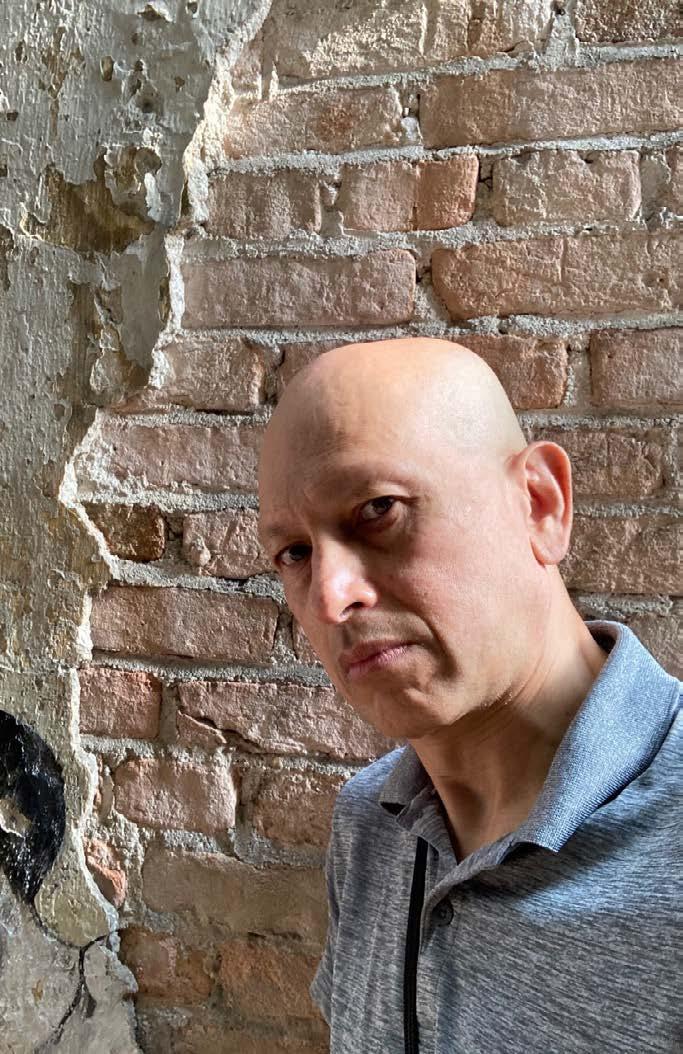
Tunku Halim now

Tunku Halim in U6, outside his Hazelwell study bedroom

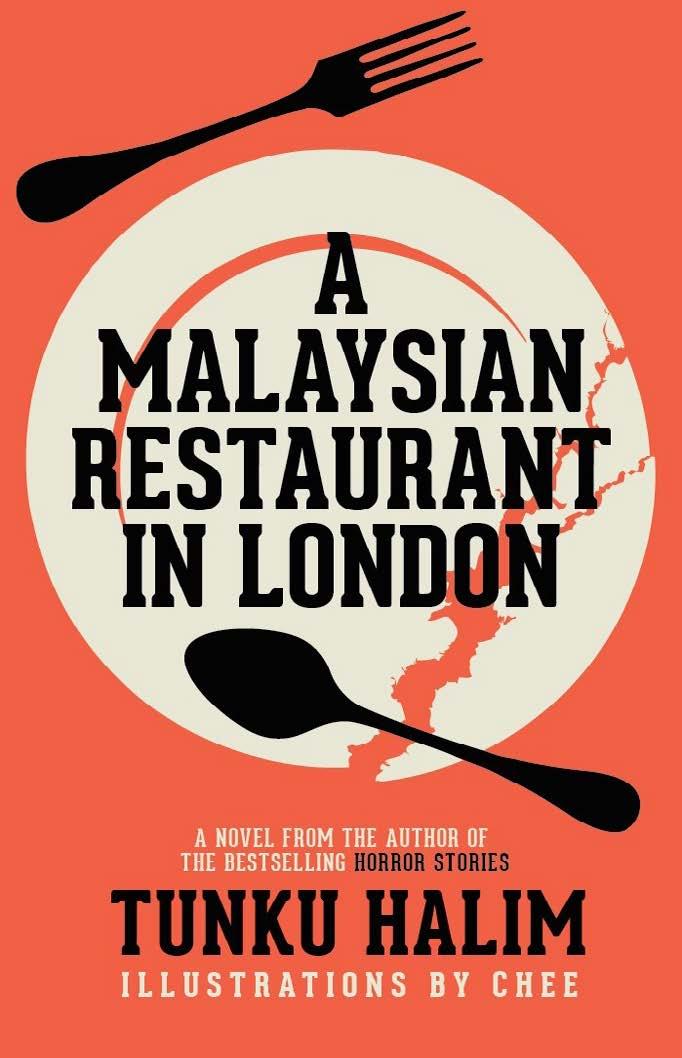
From Saving Memories to Saving Lives
Christopher Hartley-Sharpe (Cheltondale, 1980)

Chris at College

Chris now
I started at the now non-existent Cheltondale House in 1975, following in the footsteps of my father Richard Hartley-Sharpe (Cheltondale, 1953) and my grandfather Arthur Hartley-Sharpe (Cheltondale, 1919).
My years at College were largely unremarkable. I was good at the sciences and poor at languages, and never could work out why I was obliged to study Latin instead of Geography. I enjoyed rugby, despite breaking my collar bone in my first term (which rather limited my early attempts to learn to play a musical instrument) but was much less interested in the summer sports, and finally negotiated that I could pursue my interest in photography instead. In the days when this involved photographic film, a darkroom and lots of chemicals, it was a much more timeconsuming activity, but I still occasionally have the satisfaction of coming across photographs that I remember taking in some of the older Cheltonian publications.
Keen to do something more practical than theoretical with my Science A Levels, I went to the University of Newcastle to study Mechanical Engineering. Even this did not reach the levels of practicality that I craved, so I subsequently ended up working in countryside management in the Newcastle area, re-wilding former coalmine sites.
However, with the combined influences of sharing a house with medical students and being a member of the North of the Tyne Search and Rescue Team, I suddenly decided to apply for the Northumbria Ambulance Service, and ended up training to be a Paramedic.
In 1995, after taking a sabbatical to do medical research in Melbourne with my wife Helen, we moved to London and I joined the ambulance service there. Since then I have undertaken a number of roles, including being the Operations Manager for Central London for the period that included the terrorist attacks of 2005. My research experience gained in Australia has enabled me to spend much of my time undertaking operational development, and introducing new systems and working practices. My projects have included: the introduction of emergency call prioritisation; the development of a telephone advice system for low acuity calls (this subsequently became NHS Direct, now known as the 111 service); and even the introduction of cycle responders.
More recently this led me to the development of volunteer responders and my current role as Head of First Responders, for which I am responsible for volunteer Emergency Responders, Community First Responders, public access defibrillators, co-responding organisations (e.g. the Metropolitan Police Service and Hatzola), and the development of the GoodSAM Responder smartphone app.
Alongside this, Helen and I have been volunteering to provide healthcare in African countries (Helen was born in Tanzania) and since 2008 we have worked with a charity (ashantidevelopment.org) operating in central Ghana. We lead on the development of sustainable healthcare projects, are now both directors of the charity, and I recently became the Chairman. Indeed, we were in Ghana when the Covid-19 lockdowns started and we only just managed to get one of the last flights back to the UK!
I returned to an ambulance service for which the demand had tripled to 11,000 patients a day, and had significant levels of staff sickness. Within a week we had initiated the recruitment of over 1,300 temporary staff to support frontline services, including airline cabin crew assisting with our emergency call handling, and existing volunteer responders being upskilled to work with Paramedics on emergency ambulances. We also established a helpline for staff who became ill, with volunteers handling the calls and delivering home self-test kits for staff who were too ill to attend national testing centres. Initiatives that have been standing us in good stead as we tackle the second wave of the pandemic.
When we are not at work, Helen and I manage a livery stable which we own near Chichester, and enjoy overseas travel, including undertaking the trek to Everest Base Camp in November 2019.

Chris undertaking voluntary medical work in Ghana
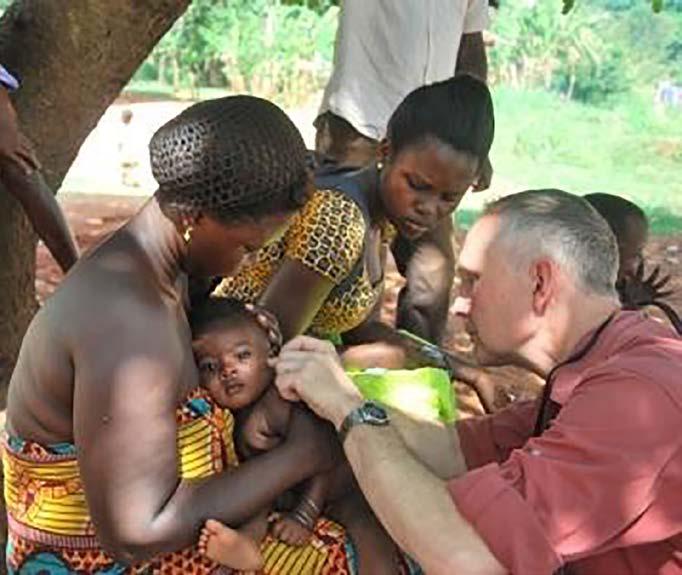
Chris undertaking voluntary medical work in Ghana

Chris and Helen at Everest Base Camp
Building an Equitable World
Shona Ramchandani (Ch, 2001)

Shona at College

Shona now
Picture this: I’m seated, cross-legged, on a cold hard floor in an all-girls’ boarding school classroom in a small town called Dehradun, in the foothills of the Himalayas. The soft sunlight glints off the smartly dressed gentleman at the front of the room, who is showing us technicolor pictures of a gorgeous, castle-like boarding school, for which he is soliciting the first class of international students. The year is 1998, and the man standing in front of us is Headmaster Paul Chamberlain of Cheltenham College. Little did I know then how much that moment, and this gentleman, would change my life forever, by offering me an opportunity that surpassed my wildest dreams.
A year later, I’m on a flight of many firsts - my first international, solo flight, my first escalator, and my first (Indian) celebrity sighting - all en route to the two years that continue to be a highlight of my life! At College, more firsts - blood pudding (happy to have since discovered more of Britain’s better cuisines), Chapel on Sundays (which ended up being mostly the international student contingent) and an on-campus pub (I definitely won points on that with my friends back home)! Not to mention a world-class faculty who inspired me in so many ways, especially in my continuing passion for Biology, Theatre and English.
Then - writing credits in the Cheltenham Literature Festival, being cast in various plays (proudest moment: winning the sought-after Drama tie!), discovering new loves in squash, cricket and rowing (not to mention... boys!), and, of course, thrilling in the wonders of the High Street! What a time of discovery and difference, of lifelong friendships, and of memories that feel like yesterday when I step back on those hallowed grounds.
After my A Levels, my experiences with a world I’d only read about in books before the age of 16 now ignited my interest in seeing the world. I ended up where I am located now, in Minnesota in the United States, by way of a short stay in the United Arab Emirates the summer I graduated from Cheltenham. As it so happens, September 11, 2001 marked my third day of University, and of course, an earth shattering re-alignment of the world as we now know it. While I had always been interested in equity and social justice, unbeknownst to me then, this moment served to cement my growing experiences of ‘difference’ into a lifelong vocation. My otherness had first become salient as an international student in Britain, but my American (and subsequent other, international) experiences gave me the language and the knowledge to understand the power of being able to navigate differences with depth and effectiveness.
Today, I work globally as a Justice, Equity, Diversity and Inclusion (JEDI) Consultant in my own firm, Chrysalis Consulting Collaborative. I successfully help global corporations, educational institutions and non-profit organisations to work better, more efficiently and more profitably by helping people to genuinely embrace, support - and leverage - each other’s unique identities. Who knew that these seeds of navigating global cultures, planted thanks to College when I was but a delighted teenager, would bloom into a lifelong passion for helping people to build an equitable world?

Shona and Caritta Lin (Ch, 2001) in U6 at the Christmas Ball

Shona and Caritta Lin at a Diwali celebration in the US in 2019

Shona and Shivani Somaia (A, 2001) in the Ashmead dorms in L6

Shona with (left) Jonnie Clough (S, 2001) and (right) Tom Barfield Grainger (OJ & BH, 2001) in U6 at their final Drama Awards Dinner

Shona with (left) Jonnie Clough (S, 2001) and (right) Tom Barfield Grainger (OJ & BH, 2001) at Tom's wedding in 2017
A Not-So-Typical Life in Education
Lynn Rowland (Xt, 1962, past parent and past Council member)
In 1954 my parents moved me from my Welsh valley primary school to The Wells House, a boys’ preparatory school situated halfway up the Malvern Hills. Here the regime was pretty tough with cold baths in the morning, runs before breakfast and a Headmaster who was not inclined to spare the rod! However, we all liked and respected him for he had our best interests at heart, instilling in us tremendous confidence in all we did. Sport was extremely strong, and I was fortunate to be part of the 1955 rugby team which won every school match without a point scored against. One highlight of the school year was the river picnic, when the whole school was taken to Tewkesbury and put on a flotilla of rowing boats. The first stop was Twyning, where the whole school bathed nude in the River Avon; there was, of course, no Health and Safety in those days!
In 1957, I arrived at Christowe, together with 14 other new boys. My time there and indeed at College was most productive and enjoyable. I remember being extremely well cared for by Harry and Jacqui Boutflower, especially when my father died very suddenly when I was just 16. Two members of staff to whom I was also grateful were Jim Greenwood who brought me on as a rugby player (I was College captain in 1962) and also Malcolm Mennie, a brilliant Geography teacher who did much to ensure I achieved a place at Oxford.
I felt extremely privileged to spend four years at that great university even if, on one occasion, I feared for my life when being chased down the High Street by a gaggle of screaming girls who had mistaken me for George Harrison, the Beatle.
My first teaching job was at Felsted School, a school similar to College but with a penchant for producing great cricketers and hockey players. I went there as they needed someone to coach rugby and my interview for the job was quite extraordinary. The Headmaster and I talked rugby for half an hour and then he offered me the job. I explained to him I wanted time to consider it and, as I was leaving his study, he asked, ‘By the way, I quite forgot to ask you, what is it that you teach?’.
My four years at Felsted were most enjoyable but, in the first week, the school Steward approached me stating it was part of his role to issue new members of staff with correcting rods! I stated I had no need for one, but he insisted. In his office he had a cabinet with a door which sprang open, revealing four different canes, each with an individual name. I remember two, Stout Stanley and Whippy Will, the latter I was told being very popular in West African schools; that is the one I opted for although I never actually applied it to an individual. However, I did keep it on my classroom desk and, whenever I lifted or touched it, it was remarkable how quiet and compliant the class became!
In 1972, I moved to The Royal Wolverhampton School and gained valuable experience working under two Headmasters, the first impervious to any change and the second quite the opposite. I remember particularly two members of staff. Firstly, the librarian who only occasionally opened the library in case the boys polluted the books and, secondly, the senior Housemaster who would sometimes suddenly appear from bushes or jump down from a tree to cries of ‘gotcha matey’ as he arrested boys who were smoking.
In 1984, on becoming Head of The Richard Pate School in Cheltenham, I was extremely pleased to have the opportunity to make the transition from secondary to primary education. I spent 22 very happy years at RPS with delightful children and extremely supportive staff, parents and governors. Upon my retirement in 2006, I joined College Council and subsequently The Cheltonian Endowment Trust which has meant I have been able to give a little back to the place that did so much for me.
It was good to renew my acquaintance with Ian Wright (past staff) whom I had known from Felsted days when he was master i/c rugby at Bishop’s Stortford College. I remember him walking towards me at the end of one of the early College matches and saying, ‘I know you so well but have quite forgotten your name.’ I had not seen Ian for about 15 years but soon began refereeing school matches for him for several years thereafter.
Another person to impress me was Phil Davies, a larger than life character who was then Head of CCJS. We used to share transport to attend IAPS meetings and, on one occasion, we were travelling back from Oxford and discussing prep schools. I happened to mention The Wells House and Phil asked in a loud voice, ‘You didn’t go to that awful place, did you? When I first came to The Junior and we played them at sport, especially rugby football, I always regarded them as the lions from the hills and we were the lambs to the slaughter.’ I thought that was splendid coming from a former England player and British Lion. ‘That’s just about right, Phil.’, I replied.
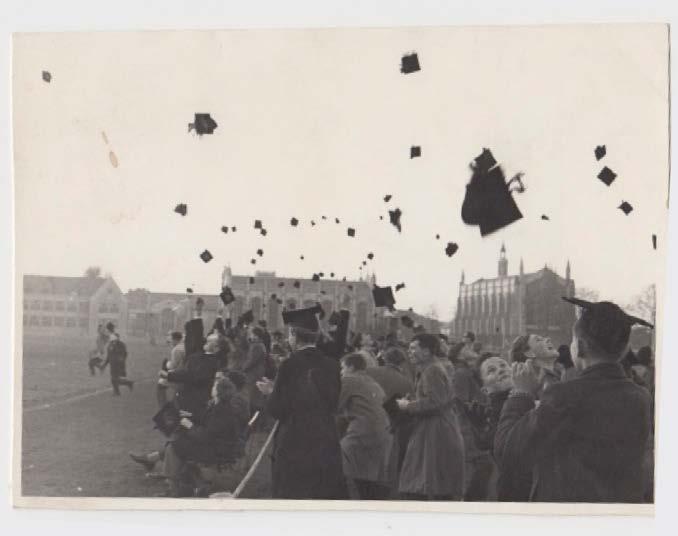
Mortar board celebration when College scores, 1961

Lynn at College
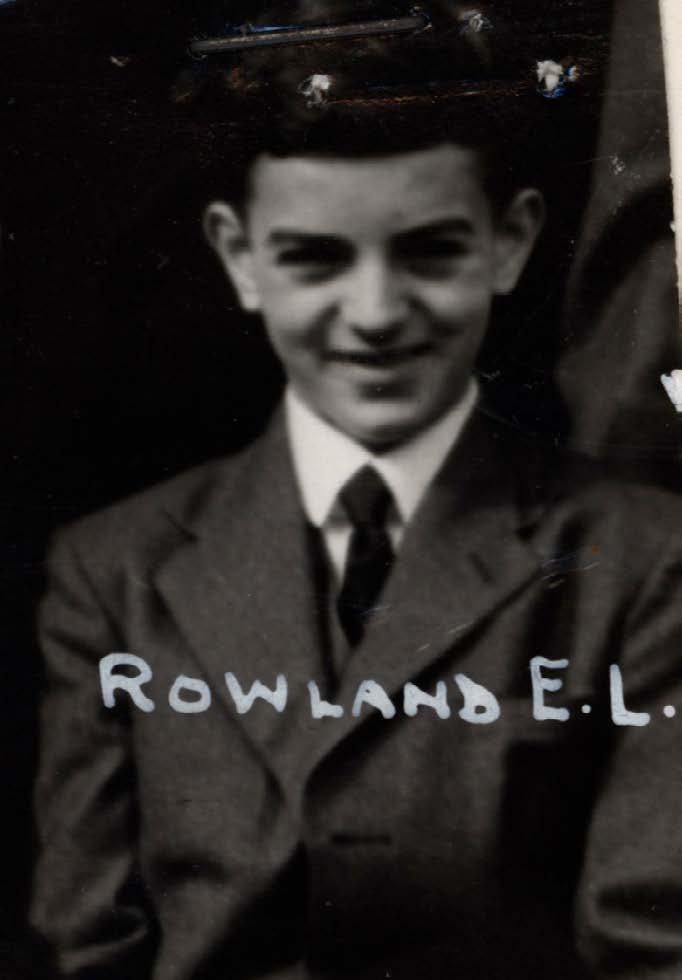
Lynn at College

Lynn's 60th at The Richard Pate School
The Four Rs
Dr Ken Yeang (NH, 1966)

Ken at College

Ken now
The most compelling issue today that all humanity, not just architects and designers, must address is the extensive damage that human society has inflicted on the Planet’s natural systems.
Aerial pollution from the burning of nonrenewable fossil fuels has affected the Earth’s biogeochemical cycles causing global climate change and the rise in global temperature and sea levels. Human society’s other deleterious acts of impairment include extensive deforestation that causes loss of biodiversity and reduction in Nature’s ability to provide ecosystem services. Besides these, there are a multitude of other callous acts on the natural environment. Scientists inform us that humanity does not have much time to repair, recover and to save our planet. Their studies indicate we have perhaps 10 years or less.
I have added a fourth R to the old saw of the Three Rs that we are taught at schools - Reading, Writing and ‘Rithmetic. The fourth is ‘Rchitecture’ because after College I went on to study Architecture. After graduating I went on to do post-graduate research for a doctorate at the University of Cambridge. My dissertation topic was ‘ecological design’, designing for a sustainable future for human society and for all species and their environments on Earth. The dissertation subsequently became the agenda for my life’s work as an architect in designing for environmental resilience. In the early years, design had been preventive, to minimise negative impacts of building on the natural environment, but in the intervening period until the present, humanity has inflicted such extensive damage to the planet’s natural systems that designing has now become no longer just mitigating negative impacts but a race and a rescue mission.
Concurrent with work as an architect, I have continued researching, which is rewarding as it engenders ideas for my architectural work. I have adopted a ‘cyclic’ process where investigative research work generates propositions, that lead to inventing novel design ideas, which are then implemented in my building projects to the extent possible, which then further leads to new discoveries, where the outcomes are evaluated and put in my writings and books. The entire cycle of researching-designing-buildingevaluating-writing is then repeated, although not always continuously and in strict sequence, as the process is often interrupted by the vicissitudes of professional practice. My recent book (published 2020) is Saving the Planet By Design – Reinventing our World Through Ecomimesis (Routledge, UK). It discusses three propositions for designing for our resilient future: Ecocentricity, where designing must be based on the science of Ecology; Ecomimicry, where our built environment must be designed and remade to emulate and replicate ecosystem attributes to become Nature-like; and that ecological design is the biointegrating of a set of four ecological infrastructures – Nature (and its natural systems as an infrastructure), Human Society (and its social-economic-political-institutional systems), the Built Environment (including all our technologies and artefacts), and the Planet’s Hydrology (being Nature’s water cycle, involving closing the loop in the use of water in the built environment and enabling the recharging of ground water).
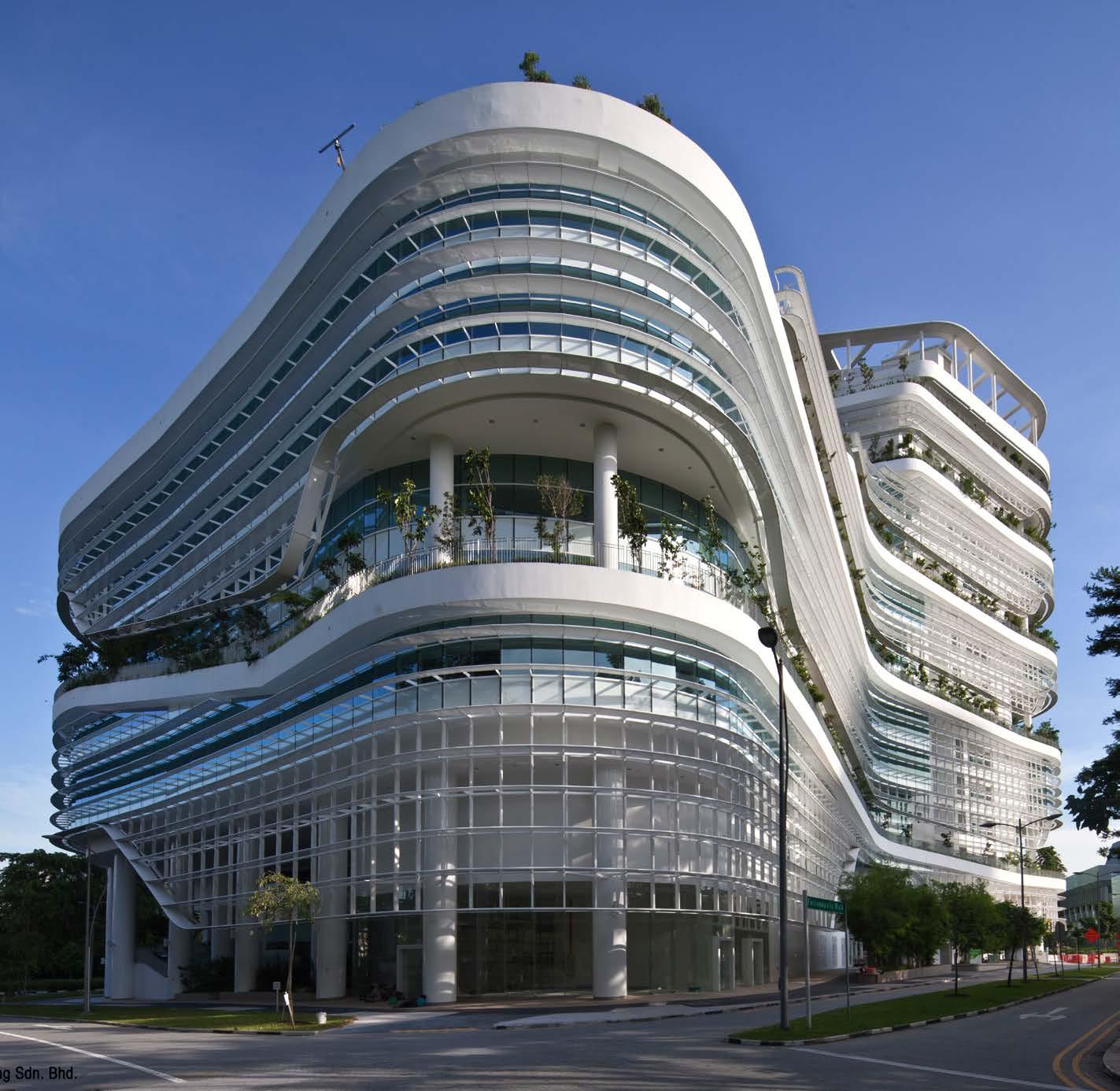
Solaris, Singapore
About Ken Yeang
Dr Ken Yeang is the Executive Director at T.R. Hamzah and Yeang Sdn Bhd. He is both an architect and ecologist, known for his ecologybased eco-architecture and masterplans that have a distinctive verdant green aesthetic. He is particularly known for his ‘bioclimactic skyscrapers’ that use recycled water, solar technology and vegetation growing up the outside of the building. Ken Yeang trained at the Architectural Association School (UK) and his doctorate is from the University of Cambridge on ecological architecture and planning. He has authored more than 12 books on green architecture. Awards received include the Aga Khan Award, Malaysian Institute of Architects Gold Medal, Malaysian Government’s Merdeka Award. He holds the Plym Distinguished Professorship (Illinois University). In 2008, he was named by the Guardian ‘one of the 50 people who could save the planet.’

Book cover for Saving the Planet by Design
Bundle Beds: Sleep Anywhere
Lucy Bartlett (née Solari) (Ch, 2004 and past staff)

Lucy at College

Lucy now
I love camping, I love travelling, I absolutely love having friends round to stay… but most of all, I LOVE a good night’s sleep. (Even more so now that I am a mother of two cheeky boys!) Frustrated that portable beds were either uncomfortable or too bulky, and involved a hunt for spare bedding and fiddly equipment that took ages to set up, I set out to change this by creating the Bundle Bed. It’s been a rather interesting journey, and I’ve learned so much, so here is my story so far...
The idea for Bundle Beds came to me when I was in the Australian outback... I slept surprisingly well out there. Why? Because of my camping swag. I loved the fact that these roll-out beds were cosy and comfortable, felt like my bed at home and were super easy to set up – wherever I happened to end up. The only problem was that it was flipping huge!
Once back in the UK, and working as a nanny, I faced quite the challenge: how to make five beds for five kids fit in one room for the monthly sleepover. It was a time consuming and exhausting process, followed by the painful pack-down the next morning in the presence of five over-tired children, frazzled by a night of low-quality sleep. ‘There must be a better way of doing this?’.
The final straw came whilst on a camping trip in Wales. Four adults, one VW polo…WAY too much stuff! The main culprit being - as usual - the bedding. The airbeds of course deflated overnight and, whilst being painstakingly reinflated, this precious bedding lay festering in a damp and murky puddle, leaving it cold, wet and less than inviting.
Enough was enough. It was time for a good night’s sleep!
I spent quite a long time trying to make a prototype in my garden shed from a large piece of foam, waxed cotton and some random reindeer patterned Christmas bedding that I’d managed to find at the bottom of my parents’ laundry cupboard! It became apparent pretty quickly that I was not a natural seamstress, and therefore the finished article was rather embarrassing! However, it did the job of illustrating my vision, and gave me a basic template from which to work.
The next steps came alongside a move to Brunei (my husband is a teacher and started a job at Jerudong International School). Amazingly, just down the road from where we were living, was a factory that agreed to prototype the product for me. They produced a far superior sample to anything that I could create, and following on from that, they agreed to manufacture the first run of Bundle Beds.
Bundle Beds launched on Kickstarter in 2016, reaching the target of £25,000 within 48 hours and ending the campaign with almost three times the goal amount. The website was then live, and beds started rolling out of the warehouse.
The birth of Bundle Beds was followed by the birth of two baby Bartletts, Arthur (just as the Kickstarter campaign ended in 2016) and Dougal (in 2018). It won’t surprise you that having kids and starting a business is utterly exhausting, and perhaps not the quickest route to success, however we learned a lot and grew slowly in those first three years. Production in Brunei was fantastic, but the logistics from there were not so simple. So, after a couple of failed attempts with Chinese factories, and coinciding with our family move to Switzerland, we brought production closer to home. Our beds are now made in Turkey, along with almost all of the materials and components of the bed.
In March 2020, Bundle Beds became a family run team, with my awesome brother Rob joining the business. Rob also has two boys of a similar age to mine and appreciates the need for easy products that allow for a great night’s sleep when out and about with the kids.
We’re excited to have launched with Joules at the end of 2020 and have a large outdoor retailer taking us on in the next few months. 2021 looks set to be the year of camping and staycations, so we are looking to launch a new product in the Spring, and hope that the next year will be a big one for us... Watch this space!
To find out more please visit www.bundlebeds.com or email hello@ bundlebeds.com. We’re delighted to offer Cheltonian Society members 10% off the beds. Please use code CHELT10 at checkout.
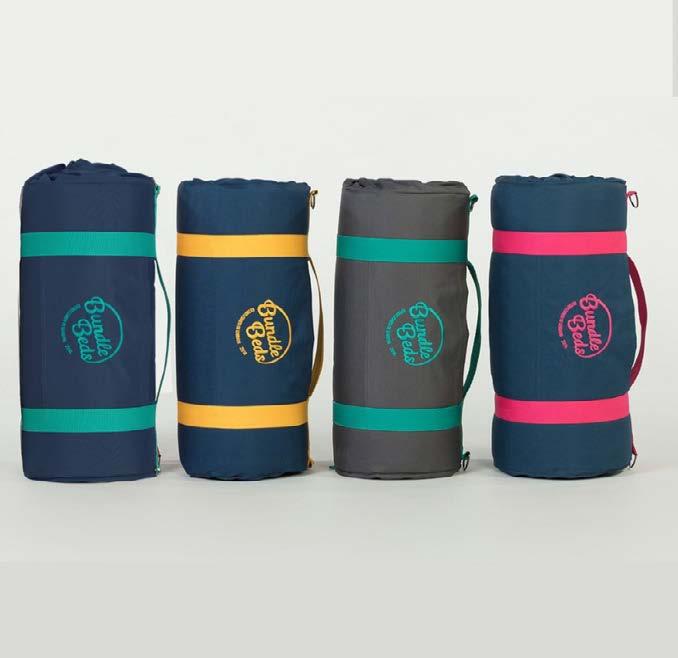
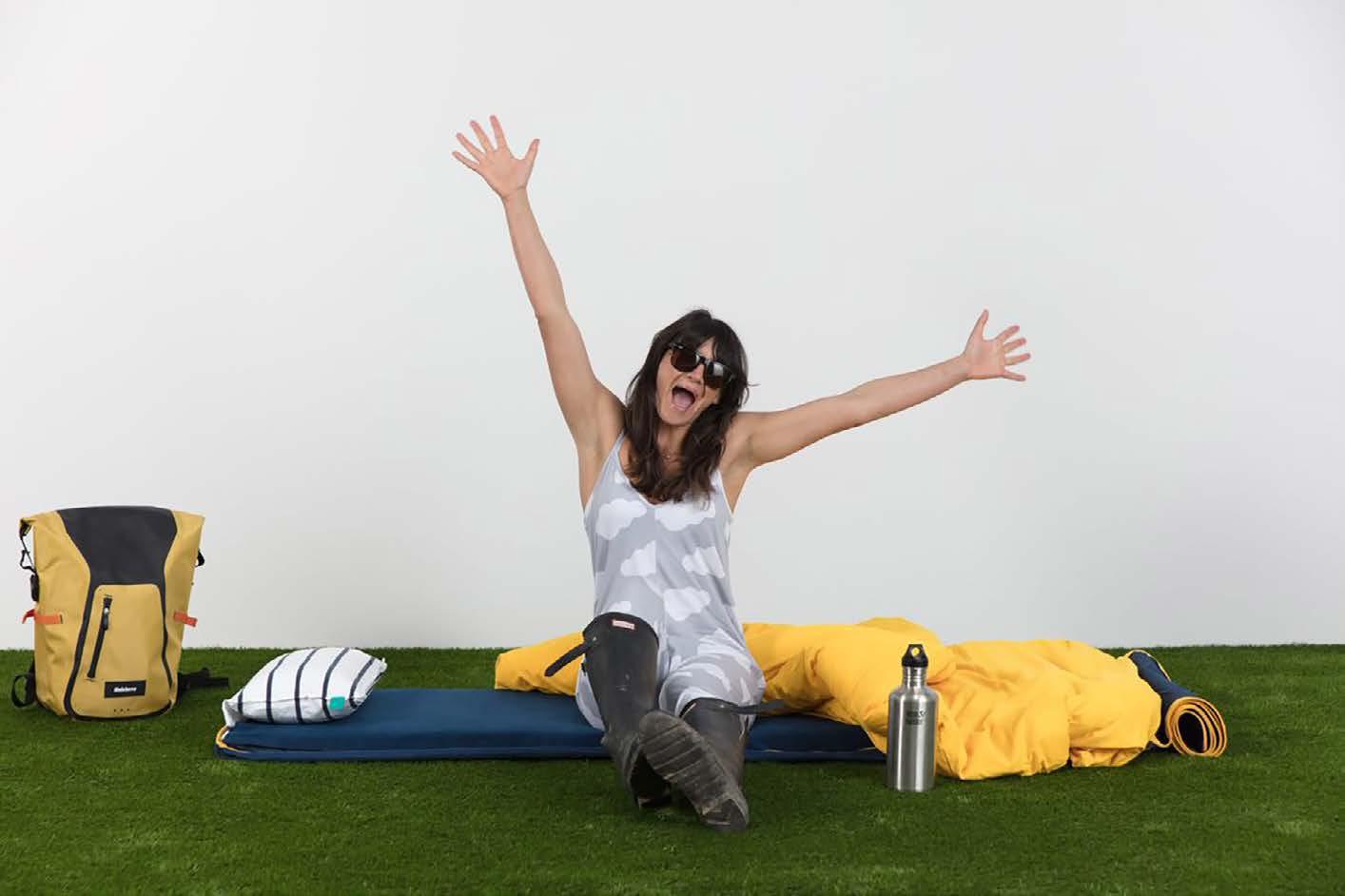

A Life in Mountains
Rob Collister MBE (H, 1965)
I am retired now but I spent all my working life in mountains, initially as an outdoor pursuits instructor at Ogwen Cottage and Plas y Brenin, the national mountain centre, in North Wales but for the last 30 years as a self-employed mountain guide. This was a profession that took me all over the world leading some very exciting and adventurous climbing and skiing expeditions until I became aware of the size of my carbon footprint and began to cut down on the amount of flying I was doing. For the last 12 years or so I confined my activities to the Alps, which was no great hardship, and still regularly travel out to Switzerland by train which I find far more comfortable and less stressful than flying. As a job, the life of a mountain guide inevitably creates tensions for a family because of the frequent absences and it does not make you wealthy, or even well-to-do – sending my children to a private school was never an option. But, overall, I have no regrets and I like to think I have enriched the lives of many by sharing the wonders and beauty of the natural world.
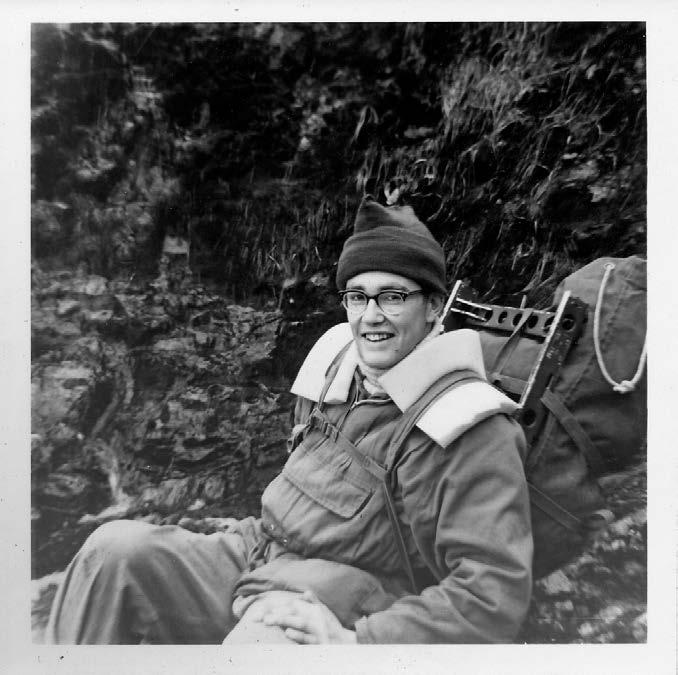
Rob on Duke of Edinburgh, Isle of Skye, 1964
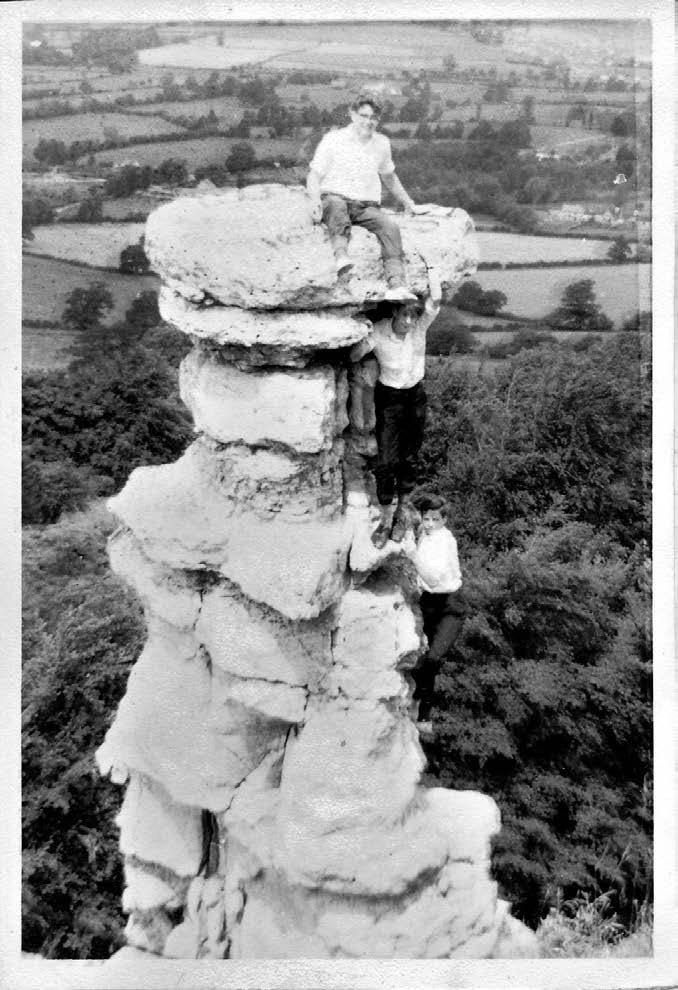
Rob perched at the top of Devil’s Chimney, Leckhampton Hill, 1964
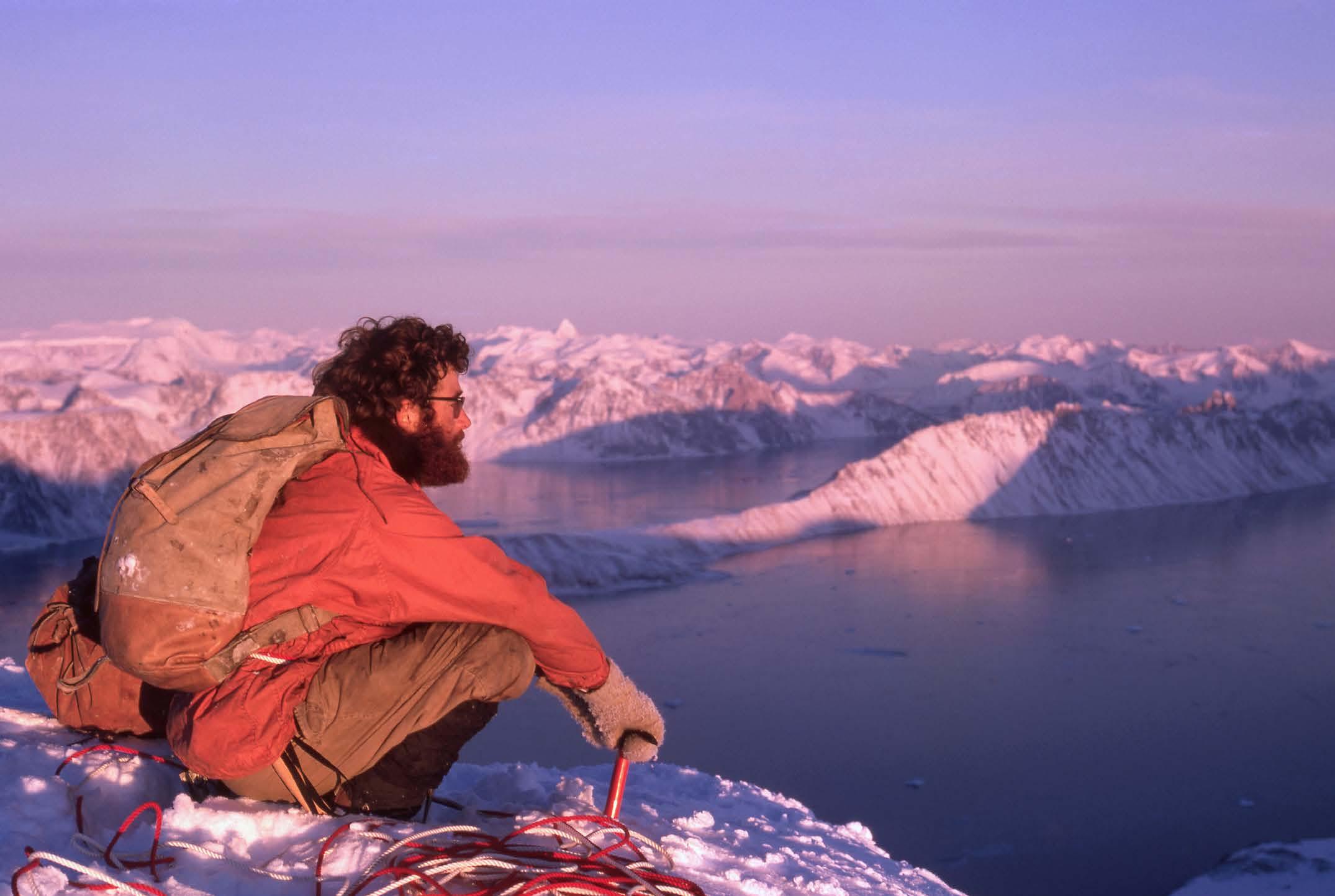
Working as a mountaineer for the British Antarctic Survey
I am not sure why I was drawn to mountains from a very early age as no one else in my family was interested but it was at College that the foundations were laid for my future career. I learned to ski on a winter trip to Zermatt, not the sort of resort usually frequented by school parties but there had been an outbreak of typhoid the previous year and, in the aftermath, hotels were offering accommodation at knockdown prices. Blowing the dust off long-forgotten photograph albums, I am reminded that I did a Duke of Edinburgh Silver Award expedition in the Cairngorms in 1963. I can recall very little of it apart from pouring rain and excruciating earache which ended in my travelling home early and being told by the doctor that I should avoid outdoor activities of that sort in future. The following year found me doing my DofE Gold expedition on the Isle of Skye and loving it. I have a vivid memory of sitting by a driftwood fire on the shores of Loch Scavaig and suddenly realising that inquisitive seals were rearing up out of the water to see what was going on.
My introduction to rock climbing was on the same camp. I was taken up a 1,000ft gully in the Cuillin Ridge which I found disappointingly tame until we emerged onto the crest of the Main Ridge to see Loch Coruisk far below and the Hebrides scattered about the sea before us. In that moment I was hooked for life. Other photos show a group of us climbing and abseiling on Castle Rock near Cheltenham and, on another occasion, three of us making a clandestine visit to the Devil’s Chimney on Leckhampton Hill. One picture shows me perched uneasily on top, wondering how on earth I was going to get back down. Another time, climbing came in handy when I was able to sit very quietly on a branch 30 feet up a tree while an angry gamekeeper harangued my friends at the foot of it. In 1965, my last year at College, the CCF camp was held on the Isle of Arran where, despite appalling weather which saw us washed out of our camp-site and into a local village hall, we managed some more climbing as well as lots of hill-walking.
Despite my Housemaster, John Bowes, telling me more than once to, ‘stop being such a Tarzan’, I somehow scraped into Cambridge where I confess to devoting more of my energy to climbing (often on buildings at night) than to my studies. I do not feel too guilty about this as the experience gained in the Alps and the Himalayas over three long vacations led directly to my first job. This was as mountaineer and dogdriver with the British Antarctic Survey which left me quite unsuited for anything but an outdoor life in the future.
During the 1970s I kept in touch with College and helped out on several CCF camps on Skye organised by the inimitable David George. On the last one, in 1976, my wife Netti, pregnant with our first child, came along too. The Gold expeditioners were camped at the head of Loch Coruisk and, after checking that all was well, Netti and I moved down to a small bothy by the sea. A violent storm blew up and in the middle of the night a cold and bedraggled group of lads burst into the hut badly in need of hot drinks and blankets. Staying at the hut next day was a nonstarter as there was no way of drying wet clothes and sleeping bags; but the obvious escape routes were barred to us as the Scavaig River was a raging torrent and quite uncrossable. Instead, we had to wade across the Mad Burn where it enters the sea and take the steep, ill-defined route back along the coast to Glen Brittle which I had last done on my own Gold expedition 12 years earlier. It was even more arduous this time and, in retrospect, must have been a close-run thing with some of the party on the verge of collapse. I remember carrying two rucksacks the last few miles and being hugely impressed by my wife’s fortitude and ability to raise the spirits of the boys. Approaching our golden wedding, nothing has changed there! After that, work and family life took precedence and I lost contact with Cheltenham until very recently but writing this has made me aware of how much I owe to my time at College.
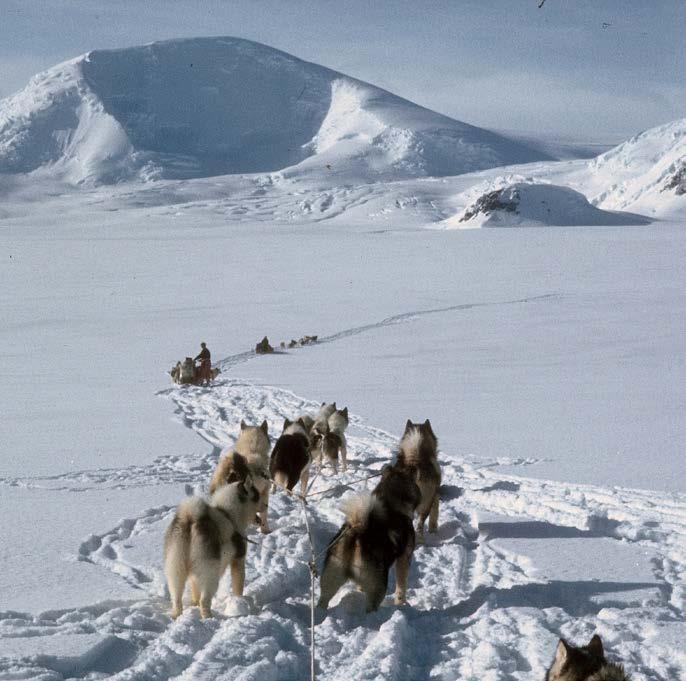
Working as mountaineer and dog-driver for the British Antarctic Survey Camp in Kashmir

Camp in Kashmir

Rob ski touring in 2010

End of the Cuillin Ridge
Young Entrepreneur of the Year
Katherine Wyn-Davies (W, 2011)

Katherine at College

Katherine now
I started at College back in 2006 and I still have very fond memories of my days there. I was lucky to be surrounded by great friends and teachers who encouraged me. I especially loved Textiles, History of Art and Business Studies. It was during a Business Studies lesson that the seed was planted that one day I could have my own business.
After College I went on to study at KLC School of Interior Design in London, where I gained my BA (Hons) degree. I wasn’t certain what I wanted to go on to do, so I decided to do a Masters. I went on to study an MSc at Oxford Brookes in Historic Conservation. It was during this time that the idea for my new business was born. Whilst studying I would burn scented candles and I began to get headaches from them. When I looked into the ingredients, I was shocked to find the poor and toxic ingredients within the candles that I was burning, and they always produced a lot of soot. I knew there had to be a better way to make candles! For a year I researched the best methods and experimented with many different ingredients before, finally, Elinor Sophia (elinorsophia.com) was born.
Elinor Sophia is a sustainable fragrance company. I manufacture all of the candles with a natural wax blend of soy, rapeseed and beeswax. It took me many, many experiments to find the perfect wick and wax for the process. They are scented with fine fragrance oils and the other products within the range are also made with renewable ingredients. I think it is important to spread the word about the benefits of using sustainable, non-toxic ingredients, as so many people aren’t aware that the ‘luxury’ products they are buying are made with cheap and toxic ingredients.
Before the pandemic I was working in partnership with Savills doing pop-up shops at their buildings in London – these were such fun, interacting with customers and getting to meet so many great people. It is a real shame that they have had to stop due to Covid, but hopefully this is just for now. This means that now my business is 100% online – it’s tough as the social media platforms where you can advertise are now very saturated with many small to medium sized businesses, but it is exciting when you see your efforts come to fruition. I have just been awarded the ‘Young Entrepreneur Of The Year’ award by the WOBAs (West Oxfordshire Business Awards). I am absolutely thrilled with this award and very excited for the future of Elinor Sophia. I hope to spread the word even more about the dangers of some of the toxic products out there in the industry and hopefully convert many more people to natural ingredients.
I would like to encourage students at College to follow their passion, even if it’s not what your friends are doing, or the standard path that many will follow. You should ‘go for it’ and you will make a success of it – just work hard, follow your dream and anything is possible!
To find out more please visit www.elinorsophia.com @elinorsophialtd
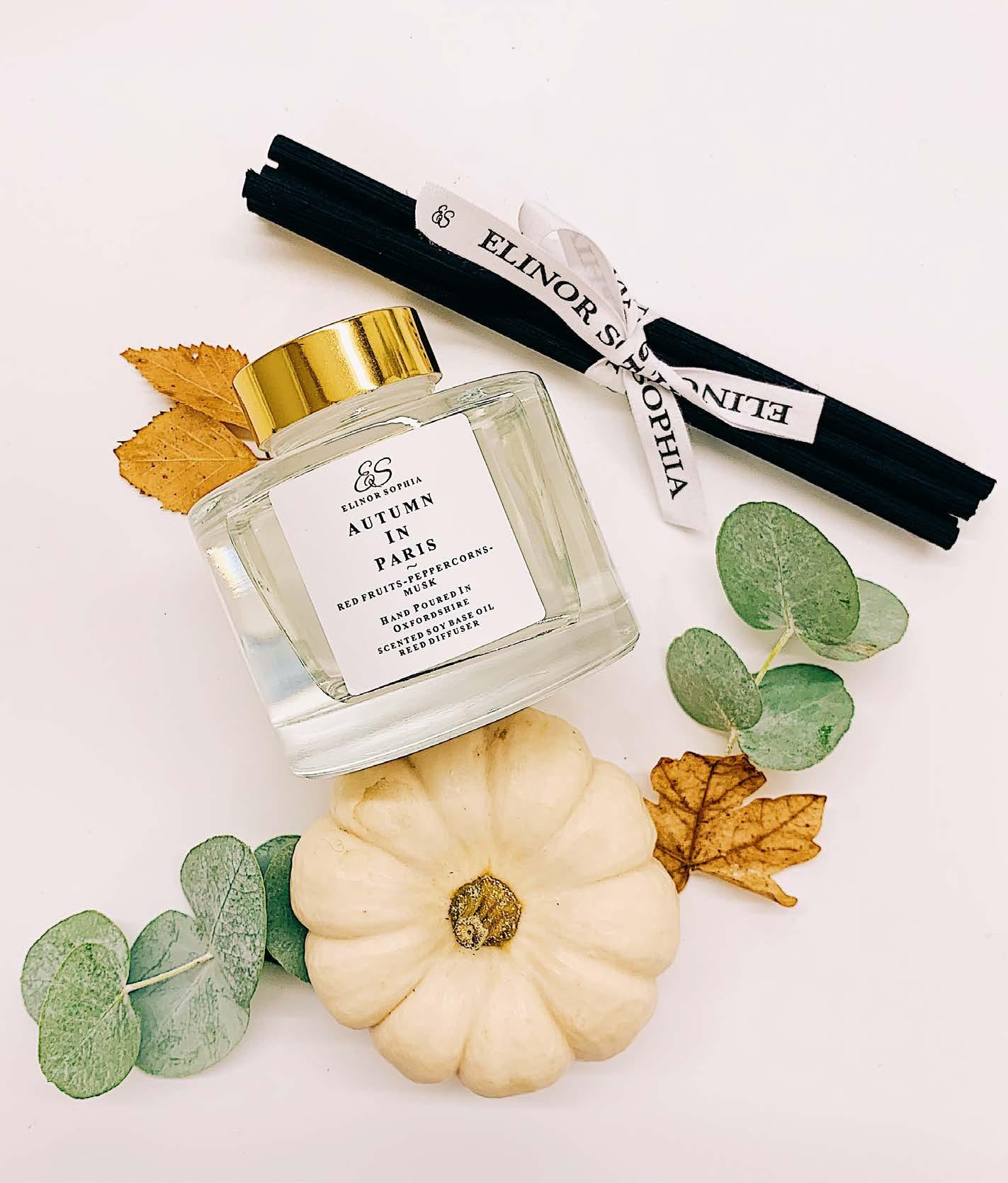
Elinor Sophia diffuser

Freshly poured candles
Freshly poured candles

Elinor Sophia 'Christmas in the Cotswolds' candle
Mobilising a Response for Covid-19
Mark Stevenson (Cheltondale, 1981)

Mark at College
Covid-19 has made 2020 a unique year for all of us. This year for me has been an particularly intense one supporting governments and healthcare systems around the world scale Covid-19 diagnostic testing. I have led my company's response to this shared global pandemic. I expect this will continue as 'testing to control spread' continues to be an important contribution to how we can all return to a more normal life in 2021.
I am Chief Operating Officer of Thermo Fisher Scientific, the world leader in serving science, based in the United States at our HQ in Boston. With a mission to enable our customers to make the world healthier, cleaner and safer, we have 75,000 colleagues globally developing innovative technologies. We are the leading manufacturer of polymerase chain reaction (PCR) based diagnostic tests and early in 2020, we developed a very sensitive assay to detect Covid-19. We have scaled manufacturing capacity to supply testing to labs around the world. I was contacted by the UK Government and met the Prime Minister in early March at No 10 Downing Street to discuss supporting three initial mega ‘Lighthouse’ labs in the UK for Covid testing. We provided technology for those labs and are now working to provide more automated systems to further meet growing testing needs.
My life journey since leaving College has been quite a global adventure. After College I studied Science, Chemistry and Microbiology, at the University of Reading and then completed an MBA at Henley Management College. I joined a scientific instrument company that was developing technology to sequence the human genome. I moved with the company to Stockholm, Tokyo, and then San Francisco, becoming President of the company. After that company was acquired, I moved again with the new company to San Diego in Southern California and then Boston. My wife and I have three children with a very global view having now worked and lived on three continents. We maintain a house in the UK as we still enjoy visiting to stay in touch with family and friends.
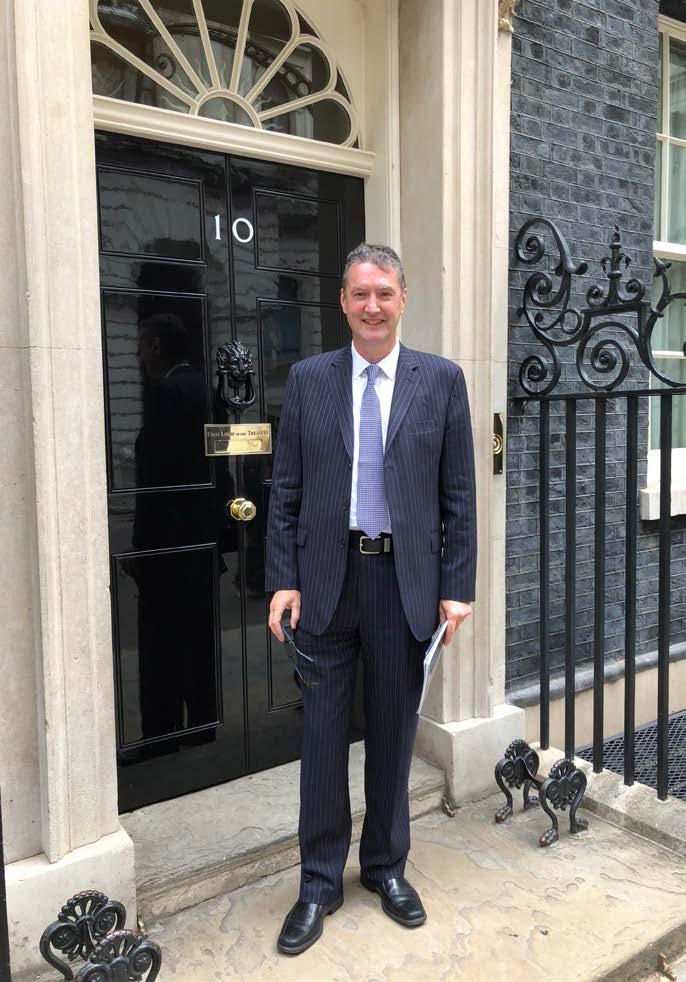
Mark met with the Prime Minister to discuss Thermo Fisher Scientific’s support of mega ‘Lighthouse’ labs for COVID testing, March 2020
This year, it will be 40 years since I left College. When I reflect on my time in College, I realise I was exposed to many different ideas and opportunities. Gerald Vinestock, my Housemaster in Cheltondale, created a great atmosphere for boys learning, living and having fun together and I made some great friends. I took full advantage of the breadth of extracurricular sport and music activities from playing rugby, rowing and playing the trombone in the orchestra. I left College not being sure of a specific career, but with an intellectual curiosity to learn about healthcare and the life sciences and with confidence to explore the world of opportunities.

Mark in his Cheltondale room
How a U-48 Sent Me to College
Gordon Mellor (H, 1947 and past parent)
Late in the evening of 17 September 1940 the steam passenger ship SS City of Benares, with 90 children being evacuated from Britain to Canada among the passengers, was sighted by the German submarine U-48 commanded by Kapitänleutnant Heinrich Bleichrodt. Two torpedoes were fired, both missing. At 00.01 hours a third torpedo was fired which hit Benares, causing her to sink very quickly, 235 miles west of Rockall. Of the 90 evacuees on board, 73 died of exposure on lifeboats or were missing presumed lost at sea.
My father had applied for me to be on board. However, I was instead assigned to be on the next boat, which was immediately cancelled by Winston Churchill, along with the whole Children’s Overseas Reception Board (CORB) plan to evacuate British children abroad. So, there I was, high and dry, with nothing to do except thank my lucky stars.
I was an only child and did not have much dialogue with my father. I was sent to sit the Common Entrance for public school. I was very nervous but managed to pass and the next thing I knew, I was on the train with my mother. We arrived at Cheltenham. No taxis – petrol was strictly rationed; it was war time. We had to walk from the station. It must have been about two miles, taking it in turns to carry the suitcase, my trunk having gone ahead.
We arrived at Hazelwell and were greeted by the Rogers. After the usual pleasantries, my mother kissed me and left. To this day I have no idea where she went or what her plans were. There I was, standing in line with five other new boys. We were shown round the House, then I was left in my upper dormitory cubicle to unpack and then proceed to the ‘sweat room ‘ for prayers, followed by the games room for cocoa where there was a super half-size snooker table.
The dress was boiler suits for lessons, smart denim blue, with a richly emblazoned gothic CC on the breast pocket and a very convenient slit on the right leg for a slide rule. Otherwise, sports jacket and trousers. ‘Keep your jacket buttoned at all times.’ There were many other protocols, mainly punishable by ‘three of the best’ by a Prefect with a gym shoe. When the Prefects shouted ‘Orderly!’ in unison, the whole House came running; the last one there got a job such as sweeping the passage.
Most of the boys at College were from a military background. My father was in the process of being a self-made man, having been in the Royal Flying Corps, then winning £500 on the Irish sweep with which he bought a taxi and developed a multimillion-pound enterprise. But it soon became obvious to all what part of the country produced me. I had a Lancashire accent, which became the target for ridicule. Determined to talk like the others, I developed my ‘pahsts’ and ‘lahsts’ together with a strained vocal delivery. Problem was after two terms returning north for holidays my speech was now a problem, in reverse, but I won’t go into that.
Of course, no females in College then. No doors on the loos. Cold shower every morning…. a beating if you were caught using warm water. It wasn’t too bad though.

Gordon at College
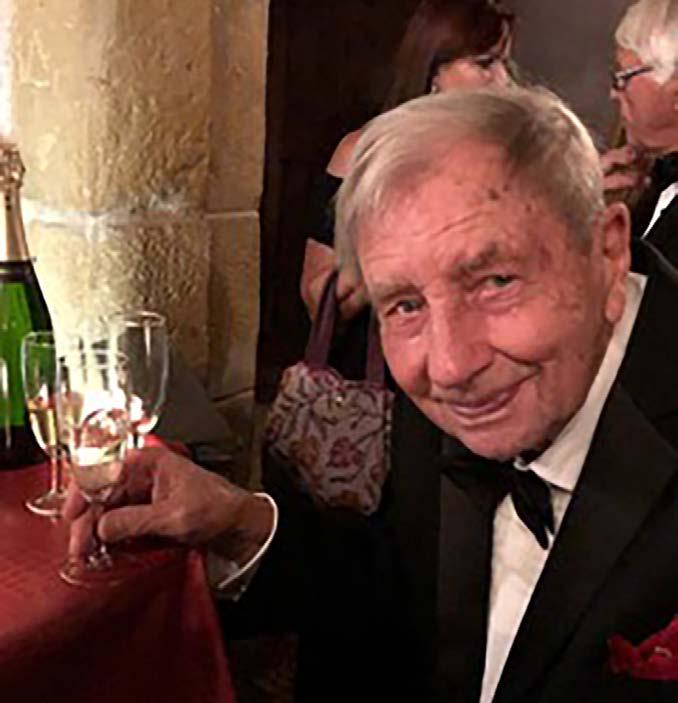
Gordon now
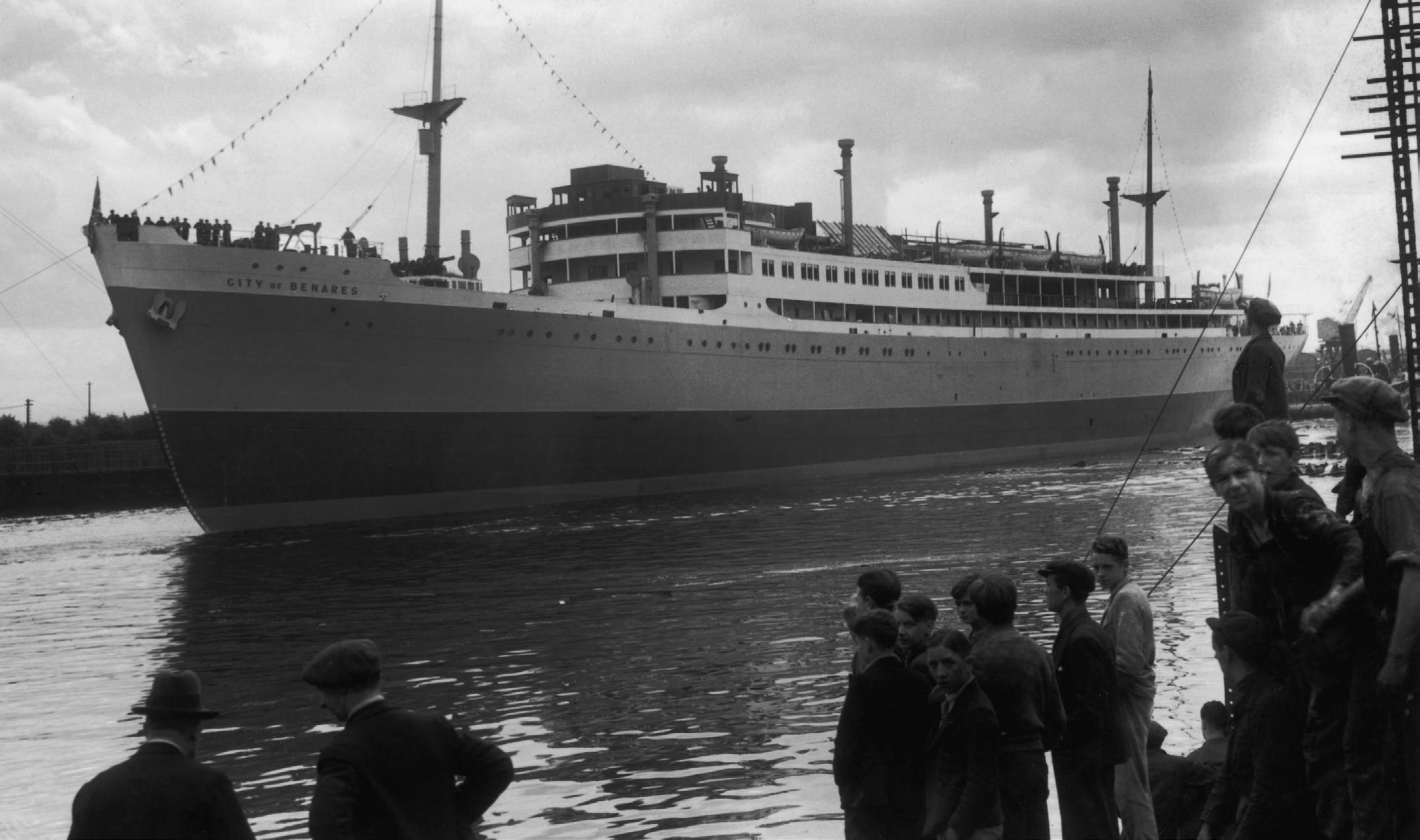
The SS City of Benares left Liverpool on 13 September 1940 with 90 child evacuees on board
From College to Creating a Global Men’s Grooming Brand
Stephen Shortt (Xt, 1990 and current Prep parent)

Stephen at College

Stephen now
Thirty years since leaving College I am still making my way along College Road every morning, except now instead of on foot with my school books, I’m in my car dropping my sevenyear-old daughter off at The Prep.
I remember the morning schlep from Christowe to the Dining Hall for breakfast back in 1990 with nostalgia. Unlike now, the food choices left a little to be desired. To wake us up in the morning, Dr Sloan would ring a bell with great enthusiasm along the Sixth Form corridor. I would, more often than not, pull my trousers up over my pyjamas and prepare to look ready to go when he peered around my door. He would say ‘Good morning, Mr Shortt’ in a booming Irish accent, and as soon as I had heard the squeaky door at the end of the corridor shut, I would promptly pull off my trousers and go back to sleep. It’s funny how some memories never leave you. I was never a morning person as you can tell, and even now my employees joke about waiting until at least 10am to get any sense out of me.
Now my morning routine involves getting up at 8am, going straight to my desk in my spare room come office, and firing up my Mac. Then I wander downstairs to feed the three retrievers (I’m not sure what possessed us to have three retrievers) and grab a cup of tea. Then back up to my desk in my dressing gown to start work. I’m not a nine to five person and love the flexibility of working from home. You might think that my lackadaisical approach to my hours would mean that I don’t achieve much. (I seem to remember Dr Sloan saying the same thing 25 years ago!) However, the last four years of my life have I think definitely proved the opposite.
In 2015 I decided to leave the family business which supplied wholesale health and beauty products for companies like Proctor & Gamble and Unilever and go it alone. I had reached the age of 44 and having a possible mid-life crisis I thought it was time to create something on my own. I sold up my shares in the family business and quit my job. On the Monday morning I woke up unemployed. My wife was a little nervous but knew this was what I had to do in my life and gave me her full support. I had always been frustrated by the choice of men’s skincare products available, especially for my sensitive skin, so spotted a gap in the market. I spent nearly a year researching the men’s grooming products available on the market, which included visiting numerous barber shops in Shoreditch, where I looked very out of place (picture a bald bloke with a map). I decided to call the brand ‘Hawkins & Brimble’ which was an amalgamation of two dapper looking gentlemen’s names from the 1930s. One year later I launched our first six products. Little did I know how hard it was going to be to make money from it.
Four years on, and what feels like a bit of a whirlwind, Hawkins & Brimble products are now sold in 23 countries from Canada and America to Australia and New Zealand. We are stocking in Waitrose, Sainsbury’s, Superdrug and Wholefoods. Despite Covid, our sales are really flying, especially in export markets such as China and India who love British products. Some recent highlights include being listed by Boots (after four years of trying), collaborating with 21st Century Fox on the Bohemian Rhapsody movie, and shipping our first jumbo jet full of products to Shanghai! We sell online through our websites globally and have stock in seven warehouses across the globe for quick delivery. Our digital strategy has really come into its own especially since Covid when people want home delivery.
My strengths at College were music and design, and despite years of playing the drums in various bands I never quite managed to go professional. So, I am glad that my creativity has helped in my current business so much. I also work as an Export Champion for the UK Government so if any budding entrepreneurs need any advice on exporting let me know.
To find out more visit www.hawkinsandbrimble.co.uk @hawkinsandbrimble https://www.linkedin.com/stephenpetershortt/
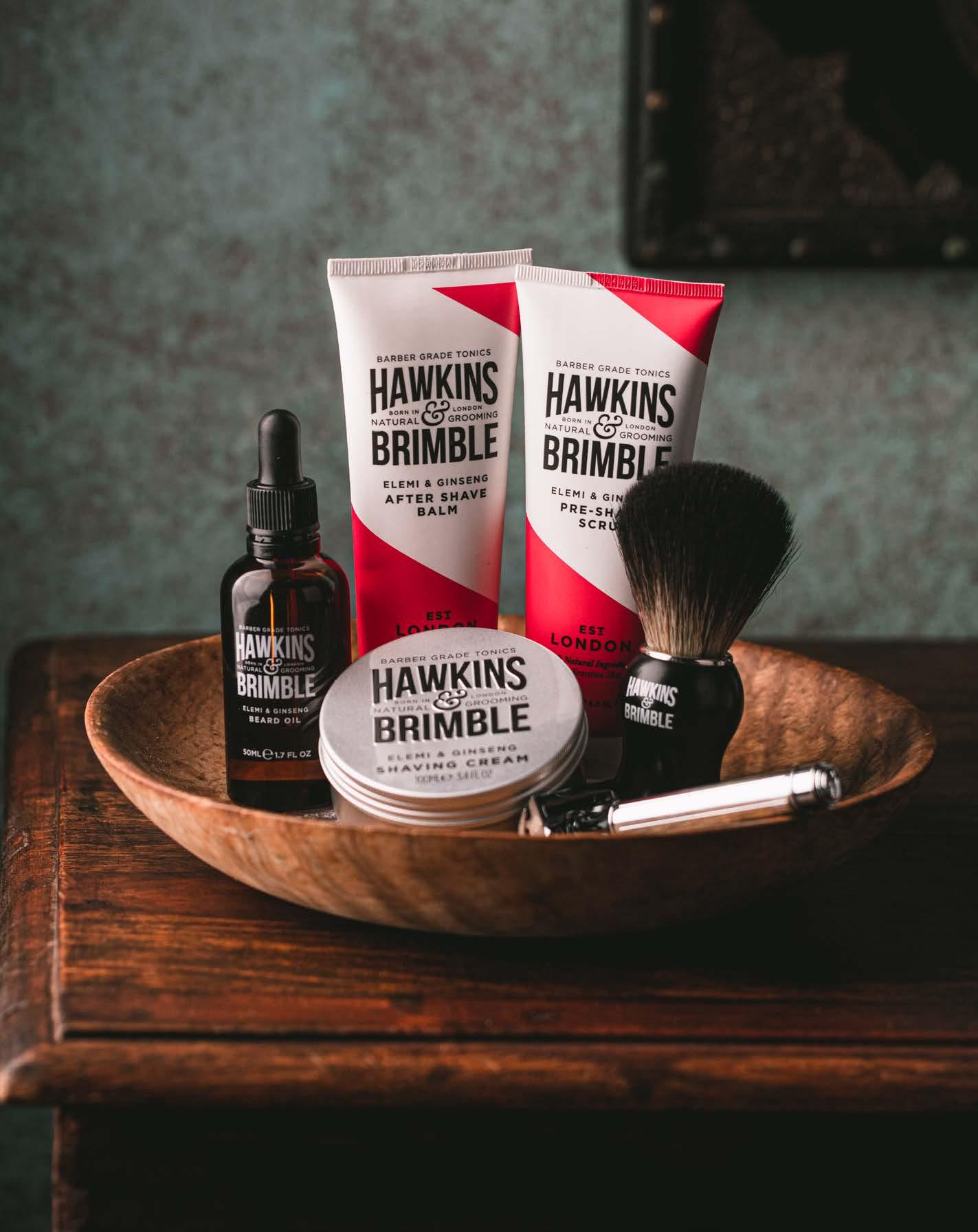
Hawkins and Brimble products are now sold in 23 countries from Canada and America to Australia and New Zealand
The Road to Entrepreneurship
Sofia Fominova (W, 2008)

Sofia at College
My first memory of College is when I came all the way from Moscow for my interview. Although I was very nervous, the experience was incredible. I fell in love with the beautiful Chapel and the idea of singing every morning; I loved the Dining Hall that reminded me of Harry Potter; I was impressed by the sports field and the Art Department; I loved Westal, which only had 16 girls back then, and Mrs Jackson seemed like the nicest and most caring Housemistress. I passed the interview and even got an academic scholarship that made my parents very happy. I was delighted because I got a pink tie and I was ready to start my A Levels.
I started College in 2006 and chose Politics, Economics, Maths and Further Maths for my A Levels. I had never studied Politics or Economics before and found them challenging at the beginning. I remember calling my dad back in Russia after my first Politics class and crying because I did not understand 80% of what we were discussing. A few weeks later, Politics and Economics became my favourite subjects that I went on to study at university.
Everything at College was so new for me and I loved every bit. Boarding with friends was always lively and the House Drama, Sports and Singing competitions were so much fun. Even the detentions I was given for coming home late on the weekends are warm memories. I also found my life-long best friend and my mentors at College and I am grateful for the community we had.
After College, I went to study BSc Politics and Economics at the London School of Economics. My entrepreneurial journey started almost straight after I graduated. While spending Christmas with family in Sydney, I noticed some wonderful trends that we were missing in London. One of them was cold-pressed juice bars with healthy juices and nutritious and nourishing food. After some research, my former partner and I decided to give it a go, opening the first cold-pressed juice bar in London. What an experience it was! We worked with estate agents to find the perfect location at the heart of Covent Garden, the local council to get permissions, interior designers to create a beautiful ambience, nutritionists to develop healthy recipes, local farmers to supply organic produce daily, and many others who made our dream come true. A year later, we opened LabOrganic, serving delicious cold-pressed juices, smoothies, salads and desserts all made from organic ingredients, free from refined sugar, gluten and dairy. The Financial Times named LabOrganic ‘one of the best cold-pressed juice bars in London’ and customers loved our products.
Running a retail business was demanding. Managing a team of employees, developing new products, staying on top of trends, and organising events were so much fun, but we also had to ensure that the business was profitable and sustainable. One of my main challenges was that I found it hard to scale the project. That’s when I decided to look into technology and create a more scalable business that would encourage even more people to lead healthy lifestyles.
I didn’t know much about technology back then but I loved the challenge! The idea was to create a platform where chefs, nutritionists and food enthusiasts would share their knowledge, recipes and meal plans to inspire others to live their healthiest, most invigorating lives.

Sofia now
Following much research, the first version of Mealz was born. We started with just a few hundred recipes and a few articles and today have more than 80 active contributors and 500,000 page views monthly. During the Covid-19 outbreak and the national lockdown, we saw a significant increase in interest in cooking and a 300% growth in Mealz users. We started offering online cooking classes taught by chefs and nutritionists and launched a mobile app that is positioned as one of the best meal planning apps on the market today. I love seeing how Mealz changes people’s habits, making it easier to try new dishes and see how healthy eating impacts their overall health.
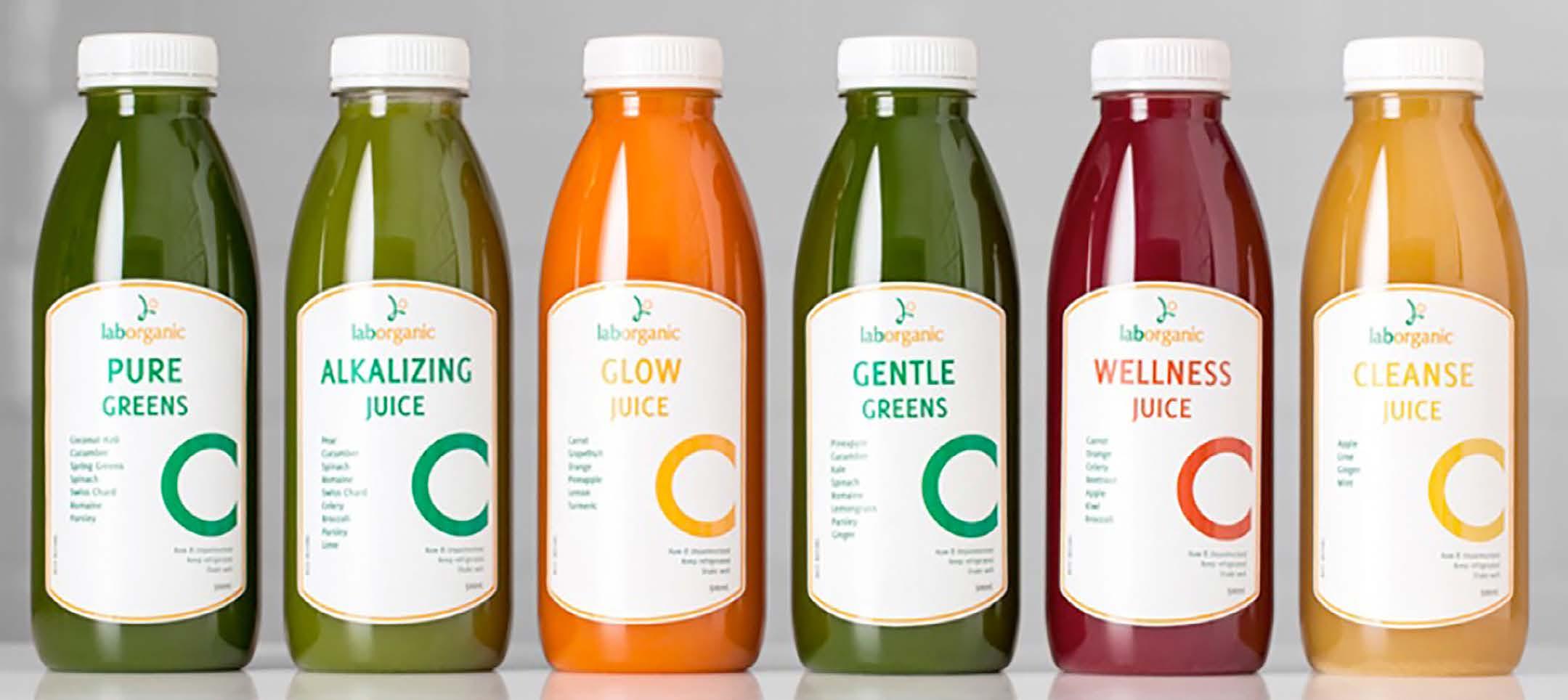
LabOrganic creates nutrient-rich, organic, cold-pressed fruit and veggie juices, alongside a nutritious food selection.
As an avid learner, I chose to heighten my knowledge, achieving two Masters degrees from Westminster Business School during my construction of Mealz: MSc in Marketing Management (2017) and MSc in Entrepreneurship, Innovation and Enterprise Development (2018). My final dissertation on Conversational Commerce and the application of Artificial Intelligence in customer service won an award from the Worshipful Company of Marketors. This higher education enabled me to further improve my business and scale Mealz to a whole new level. However, my ambitions continue to grow.
Once I discovered the transformational power of technology and learned that many industries are still very low tech, I realised how many more industries we can benefit. In early 2020 my husband and I established Truligent, a venture studio that creates and owns many other companies. We focus on creating enterprise software and business-to-business (B2B) software-as-a-service (SaaS) applications. Most of our products are R&D (research and development) heavy and define new industries.
Today we have nine companies, including Mealz. Other companies include:
• a software suite that makes supply chains transparent;
• a technology that leverages Artificial Intelligence to discover new materials;
• a tool that helps companies hire executives;
• a product that allows businesses to manage digital assets;
• and a few more...
We have established a repeatable business structure that allows us to create companies in less than four weeks. Once a company reaches profitability, we hire a dedicated team and let the business run on its own – enabling us to focus on new ventures. Such a structure will allow me to participate in the creation of thousands of jobs over the next 10 years and break into many of the traditional industries with technology.
College instilled in me enthusiasm, a positive attitude and an entrepreneurial mindset. I was constantly challenged at College; I remember when Mrs Jackson asked me to be House Prefect and how scared I was to say yes. Today, I can see that being Westal Prefect taught me how to listen to others and inspired me to improve my communication and leadership skills. At College I learned to appreciate the importance of building strong and trusting relationships with the people around me.
Most importantly, my years at College taught me to be brave and persistent. I realised that failing is a part of the learning process and today I see beauty in failing, taking it as an opportunity to learn from my mistakes. Once I believed in myself, I managed to achieve great academic results and I had fun on the way. This attitude still seems relevant to me on a daily basis.
I am incredibly excited for what the future holds. We are at the beginning of the journey with Truligent and I am thrilled to see our companies grow and change the way many industries work today. We are on a mission to generate over £5 billion in enterprise value over the next 10 years - and I couldn’t be more pleased about my entrepreneurial career, which was awakened back in College.
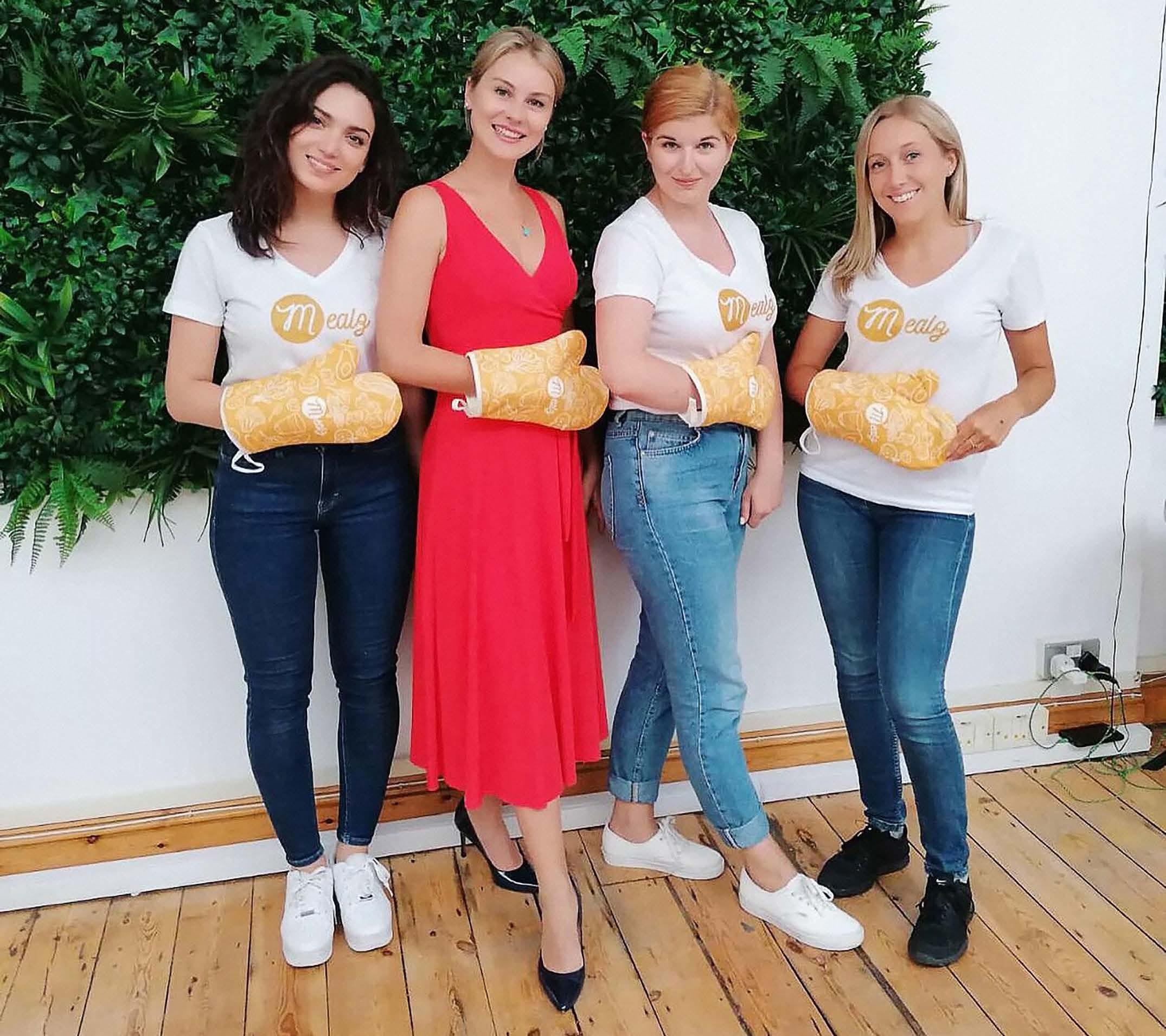
Mealz is a recipe platform for discovering healthy recipes, creating virtual collections and meal planning
A Career in Bloom
Jean Vatchara (A, 2006)

Jean at College

Jean now
It was the Autumn 2002 when I joined Fourth Form at College. Moving to a new country and adjusting to an entirely new culture was rather a daunting experience given I was just 14. Little did I know that those four years at College were to become the most formative years that perhaps defined my career and the way I thought.
I spent the majority of my College life in the Art block, mostly painting away. When I had the chance, I would even spend my prep time there. I have been known to be covered in paint and was sent back to Ashmead to change more than once. College had an amazing Art Department (Mark Ward, Sarah Millyard, Nick Nelson and most importantly Richard Gilbert), I am certain that I owe them my design career. Richard Gilbert became my first mentor and pushed me to do an Art Foundation at Kingston University as a year out before I went to the University of Newcastle to read Architecture. Architecture turned out not to be my calling even though with my A Level subjects, Art, Physics and Maths, it made perfect sense. This led me to steer my career path to a different direction – advertising and design. I worked as an art director for an advertising agency in Bangkok and directed a small advertisement for Google Hangouts. I spent a few more years in a Bangkok design firm working on branding and identity design before I returned to London in 2014 to do an MA in Information Experience Design at the Royal College of Art. This course explores the role of communication design in the digital age. At the RCA I had a chance to collaborate with Sonos and the Science Museum. Our work was exhibited at the Spanish music festival Sónar+D and at the Royal Academy of Arts for an RA Late Event Digital Disconnections in 2015.
Upon graduation, I had the opportunity of doing a duo exhibition for Gallery Sensei with a friend and colleague Alisa Sinclair in London. Draw Your Own Reflections is an interactive piece where I get the attendees to draw themselves on the mirror producing an image far different than what they may think they are capable of eliciting. This idea was first incepted in College’s Art block when I was in Lower Sixth doing exams! It was the cover of a project sketchbook made with a piece of reflective plastic sheet and Tippex.
After the London ventures, I returned to Bangkok to work as a senior designer at a Bangkok design firm, Farmgroup. The company works to build brands, help international brands create a presence in Thailand and make art more accessible to fellow Bangkokians. During the stint, I worked for clients such as Longchamp, BEAMS, and the Spanish artist Joan Cornellà. During the three years I spent building a presence for many businesses, I came to a realisation that the company that most needed a brand, was my family owned faux flower business, Permaflora.
Having joined in Jan 2020, my goal remains fairly ambitious – to change the perception of faux flowers as merely a substitute of fresh flowers, to the height of craftsmanship. Faux flower making is much more than labour-based manufacturing, it is an art form. I believe that the techniques created precisely for making them has to be highlighted, celebrated and preserved.
Our company, founded in 1990, revolutionised the way faux flowers were made. We were the first producers of ‘real touch’ flowers. Our flowers get this incredibly realistic look from the dexterity of our craftsmen and the innovative ideas concocted by my father. Permaflora products have been exported globally, including the UK. However, we have operated mainly as an Original Equipment Manufacturer (OEM) and barely have a market presence. In the past nine months or so, we have been working tirelessly to give the Permaflora the branding it deserves. I have been heavily involved in every process from the design of the flowers, the arrangement, the photography and the copywriting. Late last year, I had a chance to further synthesise my professional skills and experiences for our company by building and collaborating in an exhibition called Suckcessors at ATT19 Gallery. It is an exhibition about the inner workings of family businesses and aimed to expose the realities of inheriting an enterprise as second-generation owners via original art pieces created from our businesses. We hope to continue to challenge the viewer’s perception of faux flowers, pushing our products into art, fashion and beyond.
For more information please visit: www.permaflora.co.th
Photo by a day magazine, Thailand: adaymagazine.com

Permaflora 'Real Touch' flowers

One of Jean's paintings rom College
Supporting Zero Emission Transport Ambitions
Sam Clarke (OJ & Xt, 1999 and current Prep parent)

Sam at College

Sam selling Christmas trees in Twickenham
I believe I first met Sebastian Bullock, College’s Development Director, back in 1998 when he had the challenge of educating me towards my Economics A Level. Whilst my time at College from ‘89 to ‘99 has unquestionably helped shape me into the man I am today, I was not particularly academic and mostly a nearly-man on the sporting field. So when Sebastian, some 30+ years later, kindly asked me to speak to some budding Lower Sixth students a few years ago on my journey through entrepreneurialism, I could never have imagined such an invite as a younger man.
Throughout my career so far, I have spoken at hundreds of events, been interviewed on live TV, provided evidence to the Transport Select Committee in Westminster and even spoken at the European Commission in Brussels, days after a major terrorist attack. However, I found speaking to a group of A Level students at my old school, in front of my old teacher, is far more intimidating. Experience has taught me however, when you know your target audience and you know your subject matter well enough, then the rest is down to confidence and courage in your conviction. Courage is therefore somewhat mandatory for any soul who embarks on the free-spirited goal of charting your own course of enterprise.
I began my journey selling Christmas trees on the side of the road in Twickenham, which was far from glamorous. In order to trade, my business partner and I needed land, stock and capital and we had none. I persuaded England Rugby to allow us to use a dormant carpark for free if we gave a share of any profits to their selected charity. We flew to Denmark and somehow negotiated a deal for some of Europe’s finest quality trees with almost no deposit. Capital came in the form of credit cards. Now we had the best location, the finest quality stock and the working capital to pull it all together. Four trading weeks later, with a little help from friends and having worked tirelessly, physically and mentally, for 20 hours a day every day, we had sold out. More pertinent however is that we settled all our creditors’ outstanding bills on time, fulfilled our obligation to donate to charity and still had a worthwhile profit. In a few short years that site became the largest and most successful plot in the UK selling over 6,000 trees a season.
Personally, I re-invested my profits into travelling extensively, focussing my time in China where I spent hours trawling through gargantuan trade fairs. But the idea that ultimately hit me, nearly hit me. As an idiot tourist I looked the wrong way crossing the road and an ELECTRIC moped very nearly ran me over. I was taken aback by the prevalence of this mode of transport in Chinese conurbations even in the early 2000s. Consumed by the opportunity I then embarked on bringing electric vehicles to the UK. I naively felt I had all the answers and knew exactly what to do. In reality what really happened is I brought a flawed first-generation product to market, with sketchy supply contracts whilst borrowing tremendous sums of money from overly generous family. This ultimately paved a road of uncertainly I never wish to repeat.
Reinvention was therefore needed and quickly. I met a new business partner, we built a proper business plan to take these learnings and do it again, better. We successfully raised Angel investment and translated all our electric vehicle learning into a zero-emission delivery service in Central London called Gnewt, an acronym for green new transport. We enjoyed exponential growth in the early years and forged some priceless relationships along the way. Having started trading in 2009, our Angels very successfully exited in 2014, we sold the company in its entirety in 2017 and I personally exited in 2020.
I now have some small consultancy and advisory roles but my day job is proudly working as the Chief Vehicle Officer for GRIDSERVE who are building a nationwide network of highpowered electric forecourts. These will support the inevitable needs of the UK’s zero emission transport network ambitions. I do rather hope my previous experience puts me in reasonable stead to help deliver this next exciting chapter.
When asked to speak, I often feel drawn to reference the mistakes I made, the painful lessons that it taught me and how best to bounce back. It may sound counter-intuitive, but I genuinely now reflect fondly on my failings in equal measure to my successes. For the very few, running your own business is all too easy, for the vast majority it is unrelenting graft, sacrifice, compromise and commitment whilst performing at levels you didn’t know you had. Even then, there remains the unforgiving statistic that 90% of new businesses do not see it through the first year of trading. Whatever stage of life you are at, if you wish to embark on a successful path as an entrepreneur, my only advice would be that 110% commitment is the only acceptable bar to get there.

Sam with the Mayor of London
Sam With The Mayor of London
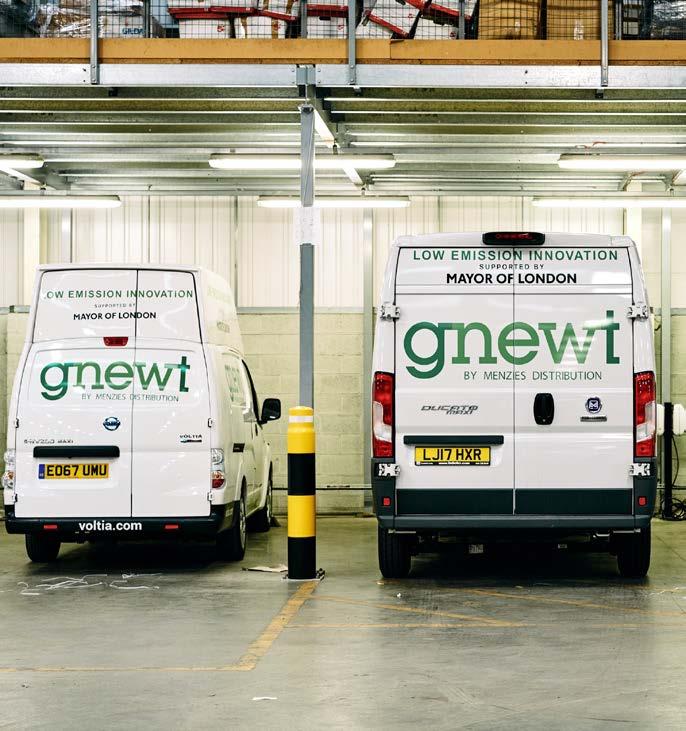
Gnew's zero emission vans, delivering across central London in partnership with the Mayr of London and Innovate UK

As Chief Vehicle Officer for GRIDSERVE, Sam is helping to build a network of high-powered Electric Forecourts
Basecamp to Biotech
Charles Ball (OJ & L, 2009) & Tom Stubbs (OJ & NH, 2009)

Tom at College

Tom now

Charles at College

Charles now
Tom and I attended College from Junior School until we left aged 18. College being a school that encourages both academic and outdoor pursuits, we were lucky to go on a number of school trips during our time there from climbing in Snowdonia to skiing in the US.
One memory that has stayed with us was the College trip to Nepal, led by Dominic Faulkner in 2008. The trip included three days of white water rafting and three weeks of trekking across the beautiful Himalayan mountains, culminating in what was supposed to be an ascent to the Annapurna Base Camp. On the final day of the trek, having woken up at the crack of dawn, we found that the night had taken some of our team members ill. They could not continue. Despite our 17-year-old selves raring to carry on, the decision was made that we turn back and head home. This memory continues to inform my decisions and actions to this day in the sphere of business. While strong leaders can persevere through adversity, the best leaders understand that sometimes perseverance means changing plans with changing circumstances.
After school, Tom and I continued our journey to the city of Oxford. Tom obtained a First Class Honours degree in Molecular and Cellular Biochemistry from the University of Oxford, before continuing his academic career by undertaking a PhD at the University of Cambridge. I took a different path, graduating from Oxford Brookes with a 2:1 in Real Estate, before starting my journey in sales and communications.
We founded Chronomics in December 2017 – the world’s first-to-market epigenetics testing service – along with two other scientists from the University of Cambridge who met Tom during his PhD. Whilst there, they realised the potential of epigenetic saliva testing – a repeatable, measurable and actionable way to predict how a person’s current lifestyle and environment will affect their long-term health.
Given my background in sales and communications, I was apprehensive about being at the forefront of an epigenetic company rooted in scientific knowledge and understanding. Originally funded by a Silicon Valley based venture capitalist, we started the RebelBio Accelerator programme for start-up companies specialising in biotech and life sciences. I distinctly remember the daunting experience of being one of only two people in a room full of 40 with neither a background in science nor a PhD. Despite this, over the past three years I have come to realise that my ability to understand epigenetics at a basic level is a powerful tool in the biotech world, which is notorious for advanced academic research but lacking in communicative skills. My skill set has enabled Chronomics to bring a complex concept to a broad customer base. Indeed, through this process I have come to learn that non-scientific values and skills can not only be applied to the scientific world but can be incredibly valuable to it. In January 2019, Chronomics raised £1.2 million in seed capital in a key scale-up round.
In March 2020, when Covid-19 hit, we had to transform the Chronomics technology and testing approach in order to apply it to the creation of a non-invasive saliva-based Covid test. Regulatory approvals were fast-tracked thanks to the support of Public Health England and the UK government. More recently, the UK government placed Chronomics on the approved list of providers for the Test To Release Scheme. Consequently, Chronomics has become one of the few companies in the world that can provide saliva-based Covid testing at scale globally.
Like the best climbers, the best leaders are comfortable being uncomfortable. Choosing to step into calculated risk may be uncomfortable, but it is also how progress gets made. The decision to turn back after weeks of trekking in Nepal was not an easy one to make, particularly for teenagers who thought that reaching the Annapurna Base Camp was more important than the interests of the entire team. Similarly, being one of only a few non-scientists in a heavily science-based world is neither comfortable nor easy. Yet, the combination of Tom’s academic experience and my skills in communication has allowed us to both navigate and merge biotech with what was originally a consumer orientated business, culminating in a business that is now scaling up from 10 to 50 employees in the coming weeks and months.
Despite our progress, we have only just reached base camp in the sphere of business. As the world continues to change and new challenges come our way, we still have the rest of the mountain to climb.
To find out more visit www.chronomics.com

College Nepal trip, 2008 (left to right) Charles, Tom and Will Ripley (S, 2009)
A Different Path: ‘Life is a Breeze’
Mike Dalton-Morris (Xt, 1991)

Mike at College

Mike now
At College, as in life, I have not typically taken the easiest path. The reason for this is not to be rebellious, or to be different. There was also conformity, stubborn singlemindedness, reluctant agreement, as well as a curiosity in what I did; it was simply my adventure and I wanted to have active input. My journey after College took me to Australia to work in the sports industry.
I was very happy at College and I have many great memories of the people and the place. I am grateful to those who understood me (some of the time), supported and invested in me (most of the time), challenged me (all of the time) and set me on the right path with a kit bag of skills to cope with life ahead. The foundation provided by College and my family was excellent and put me on the right path. I was a capable student, but as one report stated: ‘Life is a breeze for Mike’. This encouraged me to find greater focus, to be clearer on what I wanted. It was fair, but perhaps life is a breeze for us all to manage?
The thing is the breeze is unpredictable; it can help or hinder, but you have to manage it. In sport, as in life, you can play with or against the wind. Some days the wind is against you, there are cross winds, or there are calm ‘perfect days’ but you have to play it, whatever your sport or situation. We all have a choice how to metaphorically ‘manage the wind’, either working it out, dealing with it, or let it impact your approach, your mindset, your confidence, and ultimately your result, if you let it.
My experiences outside the classroom had a significant impact on how I was perceived at College, another important transferable lesson. I always enjoyed being active and ‘hands on’, so I volunteered to run backstage productions, an introduction to events management. It also connected me with different people, including Head of Careers, Mr Pearce.
My North Star, what makes me tick, is sport and directing events. It’s been the centrepiece in my life. The accepted path after College was enrolment at a ‘good’ university, to do a ‘proper’ degree, to set yourself up. I wasn’t clear what I wanted to do, but the traditional path and expectations didn’t resonate with me.
Mr Pearce understood my goals and what success looked like for me. I didn’t want to go to university for the sake of it. He found a Sports Science course at the University of Loughborough and I found a new motivation to succeed. The problem was I now had to play into a strong intellectual breeze having dedicated my time to sport rather than study; my mock results were appalling, so I needed to focus. My teachers supported me, as they would have done earlier if I was less resilient. I was no longer fighting against the wind; I was managing it. I narrowly made the grades, an unexpected surprise for all!
The learning here is that it’s important to play smart, and manage the prevailing wind, not let it distract you. I was lucky to get great support and found what I loved. The wind of change is blowing throughout the world currently, and those that find focus will be more likely to succeed.
Before heading to Loughborough, I planned a gap year in Australia, playing sport, farming, and teaching at Wesley College in Melbourne thanks to a College Master (Mr Haslam). I grew up fast and learned a great deal. I loved life in Australia and it suited me. I connected.
Loughborough was amazing, with people from all walks of life, but with a common bond around sport. Life was good – until a storm hit! While playing 7s rugby, I devastatingly tore my knee ligaments, requiring a full reconstruction. However, that storm cloud had a silver lining, as I channelled my efforts into sports administration, which ultimately set me apart, as I secured a coveted apprenticeship in the sports industry.
I had a great start to my career and a rare opportunity, but London did not feel right. I had the chance to relocate to Australia, with potential to work on the Sydney Olympics 2000, so I took a different path… philosophically knowing that I’d rather try and fail, than regret not having a go. Life is a breeze, taking me back to Australia to work in events, exhibitions and then onto the media industry.
I enjoyed working in media, with lots of opportunity and broader business learnings. Eventually I returned to the sports business I loved, securing a dream role at Cricket Australia (CA) leading digital sales and commercial strategy. I’m not the only ‘Pom’ at CA, but I am the only one with a dissertation on cricket from a UK University.
College life as a boarder prepares you for independent living, but it can also be hard at times. My family OC connection is through my brother James Dalton-Morris (OJ & Xt, 1990), sister Alex Marriage (née Dalton-Morris) (Ch, 1994), brother-in-law Tom Marriage (BH, 1994) and his brother Ollie Marriage (BH, 1991). Alex and Tom’s daughter Chloe has Cerebral Palsy, the result of tragic circumstances. Chloe is an amazing young lady, with her parents the wind beneath her wings, encouraging her to expand her horizons and realise she is capable of more than she thinks. Chloe’s disability brings perspective, but like all kids she can do far more than she thinks possible, a great lesson for everyone.
Inspired by Paralympian Karen Darke, Chloe and Tom set up a Quest79-mile bike ride for the Spinal Injuries Association. Quest79 encourages individuals to do more than they imagine possible, turning challenges into opportunity. It leads by example through commitment, determination and spirited resilience, and inspired me to support in Melbourne. Everything was planned, before the Covid storm hit.
Invariably those affected by disability or spinal injury find a way, so we needed to demonstrate the spirit shown by Karen and Chloe. Melbourne’s strict Covid lockdown restricted travel up to 5km from home, for an hour per day. The solution was to ride on a turbo-trainer on my porch, completing 254km before Ollie, Tom and Chloe battled through the wind and rain from Bristol to Newbury to complete their Quest.
Life, like the weather, is not always straightforward and invariably harder for some than others. The weather, as per life, is never perfect; it can be surprisingly good or disappointingly bad, but you learn from both, sometimes more lasting lessons in adversity. With hindsight, my advice to my younger self would be to encourage him to manage the wind, learn how to play with or against the wind, in sporting parlance. You can control your goals, yourself, and how you approach things. You can’t control others, their expectations or unknowns. You can’t control the weather!
The wind of change will always blow, and the unexpected will happen, and you have to deal with it. Hopefully you don’t have to struggle alone as there are safe harbours to help you when you face an unexpected storm, as you will. I wish you well.

Tom Marriage (BH, 1994), Oliver Marriage (BH, 1994) and Tom’s daughter Chloe completing their Quest 79-mile bike ride for the Spinal Injuries Association
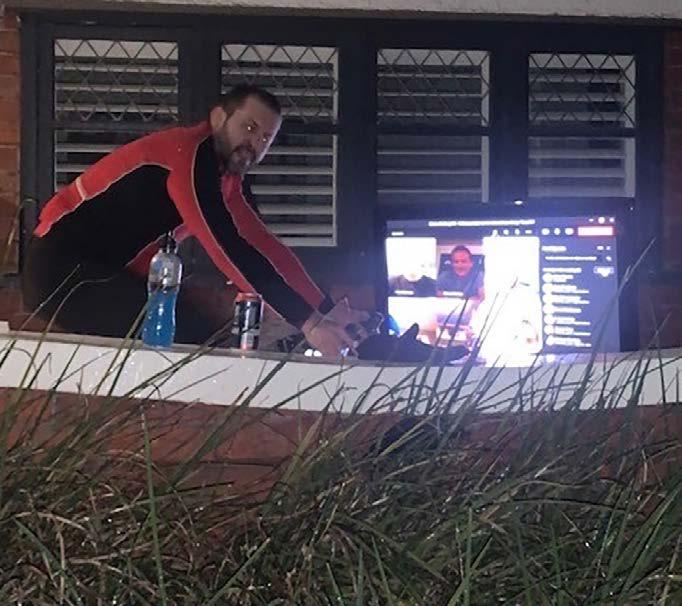
Mike cycling 158 miles for Spinal Cord Injuries Australia, on a turbo-trainer in his car port during the Melbourne lockdown
Duke of Edinburgh Gold Reunion
Squad: Philippa Coull (A, 2012), Laura Bevan (A, 2012), Ollie Braithwaite-Exley (L, 2012), Lily Haycraft Mee (Q, 2012), Freddie Unwin (S, 2012), Oliver Rodney (Xt, 2012), James Philips (L, 2012), JJ Ball (Xt, 2012)
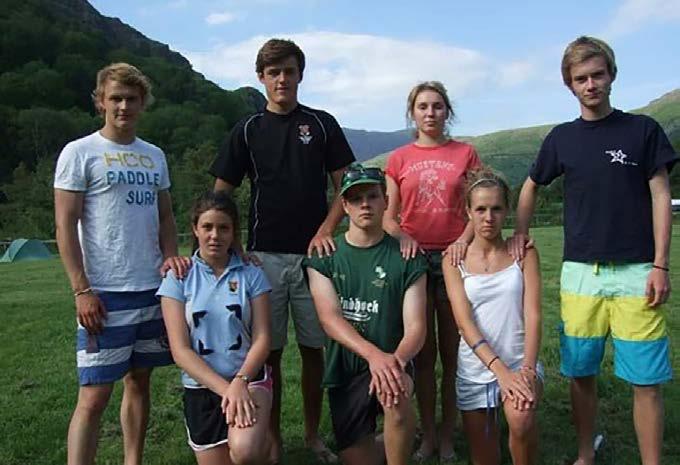
DofE Gold expedition in 2011

Reunion expedition nine years on. Back row, left to right: Ollie Braithwaite-Exley (2011)/JJ Ball (2020), James Philips, Lily Haycraft-Mee, Ollie Rodney Front row, left to right: Philippa Coull, Freddie Unwin, Laura Bevan
Of all the things that 2020 will be remembered for (the era-defining pandemic, catastrophic wildfires, global protests), it is of course, the ninth anniversary reunion of our Duke of Edinburgh Gold Award expedition which will truly go down in history.
Back in 2011, an elite group of seven athletes from College (Philippa Coull, Laura Bevan, Ollie Braithwaite-Exley, Lily Haycraft-Mee, Freddie Unwin, Oliver Rodney and James Philips) embarked on an epic 5-day expedition through 120km of harsh landscape in Snowdonia, to complete what would become our greatest achievement thus far, our DofE Gold Award. Although only Oliver R actually managed to receive the award from HRH Prince Philip, the expedition itself will go down as one of the highlights from our time at College. We survived almost entirely on cubes of jelly, with James at the front scouting for campsites, and Lily (or Great Aunt Muriel as she is retrospectively known) at the back with her walking sticks. Some key moments from the expedition include: falling into a bog on day one with all our gear, gorging on pasties on top of Snowdon (against DofE rules, sorry Mr Bullock), and being literally blown off the summit of Snowdon. Despite having only three hours of sunny weather over the expedition, it certainly kickstarted our love for adventure and exploration.
To commemorate the ninth anniversary of our Gold expedition, we decided to do another expedition (DofE Platinum) to see how our mid20s have affected our fitness and team morale. As K2 and Everest were off the cards due to Covid, we decided to settle for the equally challenging Wye Valley as our destination this year. Seemingly unaware of the world falling apart around us, we set off from basecamp with the original team - other than substituting JJ Ball for Ollie B-E - ready for three days trekking a vaguely planned 80km route. Although it quickly became clear that a few years in the working world hadn’t done wonders for our fitness, it was evident that regardless of how many years it’s been since we were all together it felt like only yesterday (later reaffirmed when mistaken for a group of 17 year olds actually doing DofE). Along our walk we re-lived some golden memories from College: Third Form discos, CCF camp, House pots matches, tracksuit tea, singing/shouting hymns in Chapel and carefree summer evenings on College Field.
Of-course no Floreat/Cheltonian article would be complete without mentioning what we are doing now after College. Well, it’s a diverse group, we’ve got the following: Dr Coull is a GP in Poole, JJ is a solicitor at Travers Smith, Laura is finishing her WPP Fellowship in New York, Oliver R negotiates acquisitions at Amazon, Ollie B-E is a fishing guide in Russia, Freddie is a chartered surveyor for Cushman & Wakefield, James works in property at Douglas & Gordon, and Lily works at a tech startup.
After making some more very happy memories, we are already planning our expedition (DofE Diamond) to Nepal in 2021, maybe.
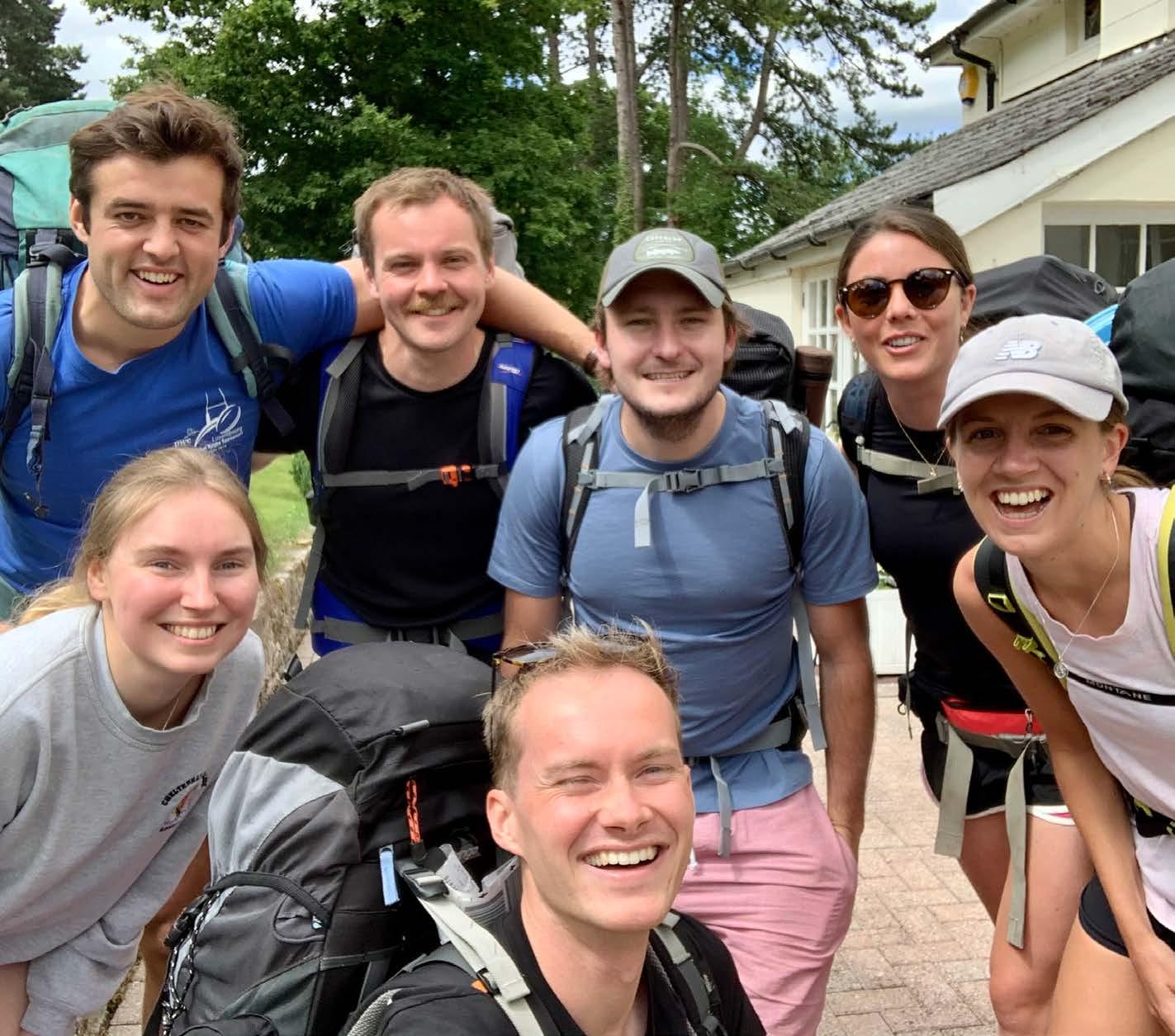
Reunion expedition in 2020
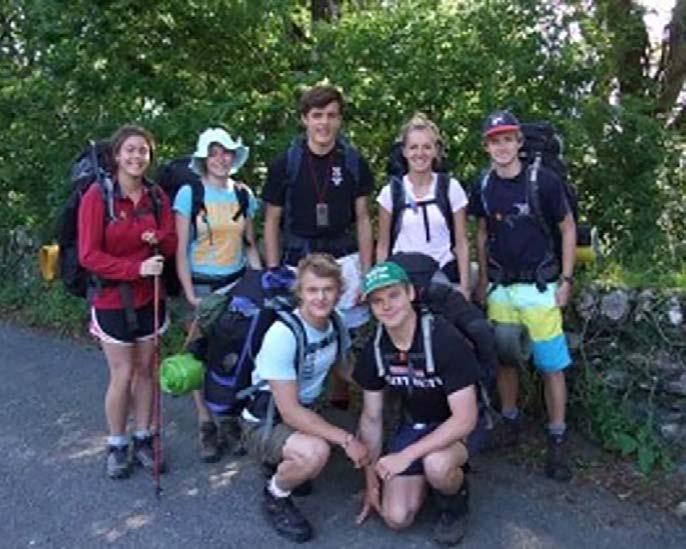
Gold Expedition in 2011

Gold Expedition in 2011
OC Lockdown Wedding
Olivia Swainson (Ch, 2005) and James Holding (L, 2004)
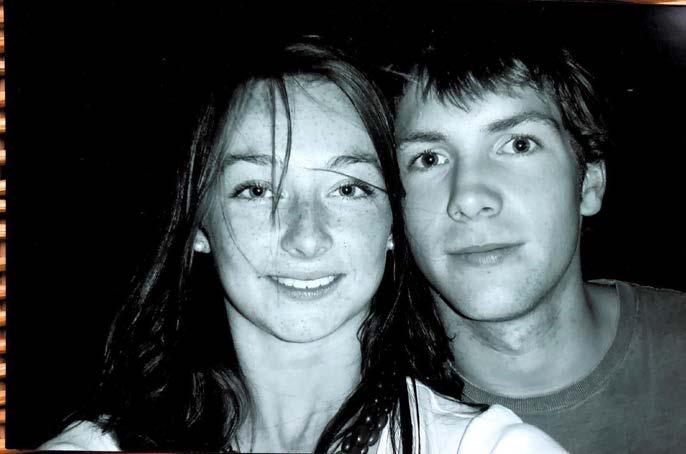
Olivia and James at College
Olivia and James at College Olivia Swainson (Ch, 2005) married James Holding (L, 2004) Saturday 18 July 2020 at St Peter’s Church, Leckhampton, Cheltenham.
When the first lockdown started, we never thought for a moment that we would be able to go ahead with our wedding. However during May and after much deliberation, this was the decision we finally made.
With restrictive measures that meant many of our guests would not be able to attend and a headcount reduced to 30, we took the decision to stick to our original date and go ahead with our wedding.
Despite the challenges, we were incredibly fortunate to have a full ceremony in St. Peter’s Leckhampton followed by a wonderful garden reception surrounded by family and friends whilst remote guests joined us via a video feed, carefully directed by the groomsmen.
We worked with our original suppliers and called in some favours from resourceful friends to pull off the wedding day. It was as close to the original plan as possible but on a much smaller scale. This year will hopefully allow us to celebrate with our full guest list, but we are very lucky to be one of the few 2020 wedding couples to actually be married.
Other OCs in attendance included Victoria Kendall (née Cadbury, OJ & A, 2005), Katarina Påhlson-Möller (Ch, 2005), Jamie Dey (OJ & H, 2005), David Hughes-Jones (Xt, 2005), James Carter (L, 2005), Robert Clarke (NH, 2004), William Thornton (L, 2004) and Jamie Hall (L, 2004).

James with Best Men (left) William Thornton (H, 2004) and (right) Robert Clarke (L, 2004)
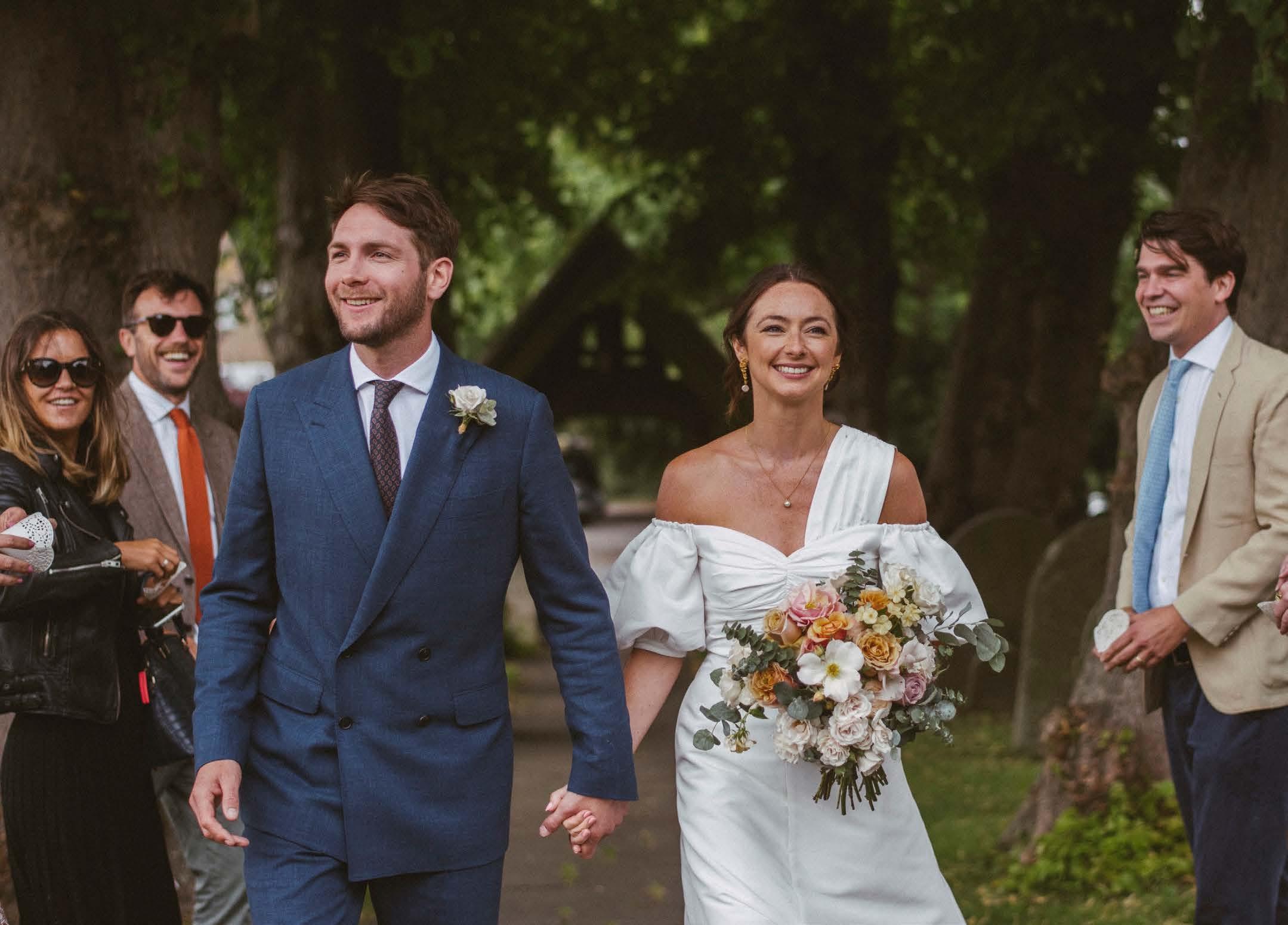
James and Olivia, one of the few 2020 wedding couples to actually be married, with OC guests (far left) Katarina Påhlson-Möller (Ch, 2005) and (far right) Jamie Dey (OJ & H, 2005)
Our fond wishes to all Society members who have got married or had a baby in 2020. Please do send us your news to society@cheltenhamcollege.org. The usual Announcements page will return in the next edition.










